theartsdesk in Zanzibar - behind the veil | reviews, news & interviews
theartsdesk in Zanzibar - behind the veil
theartsdesk in Zanzibar - behind the veil
Searching for the real island at this year's Sauti za Busara festival of African Music
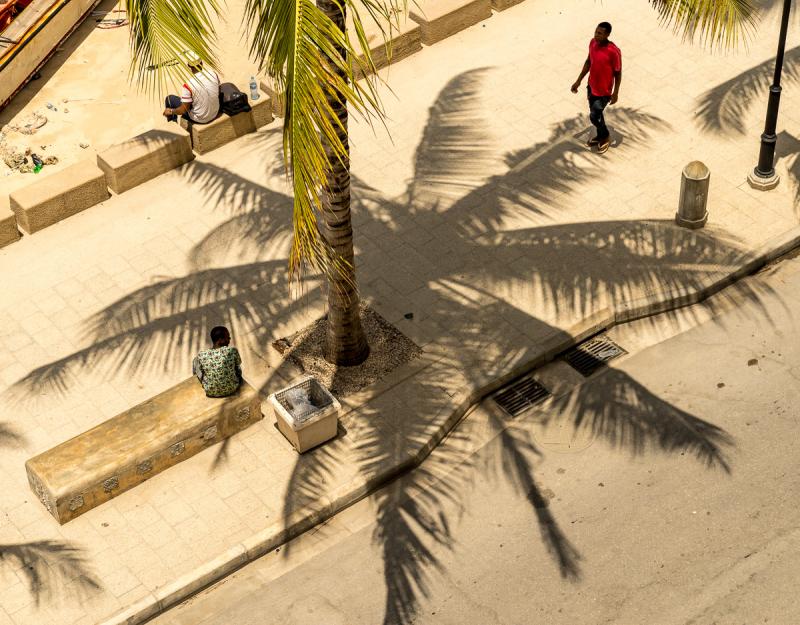
Damn exotica.
Zanzibar is, on first appearances, irresistibly exotic. Exotic and graceful and slow and warm and easy
It’s embarrassing to admit how easily the exotic pull of these islands hacks into your main frame and takes control of your cognitive faculties and critical discernment. Fact is, to a pasty-faced subject just off the plane from some wintry destination in the northern hemisphere, Zanzibar is, on first appearances, irresistibly exotic. No argument. Exotic and graceful and slow and warm and easy. Clothed by the dense wet heat, in the honeymoon of your arrival in Stone Town, you float along the sea-front, gazing out at the dhow-bobbing sea or up at the old palaces whose days of virgin whiteness are long gone, ricocheting gently from one friendly “karibu! Djambo?” (“welcome! What’s up?”) to the next, past the grizzly bastions of the old Arab fort, the scaffolded colonnades of the Beit-el-Ajaib or House of Wonders, the sober old customs house, the Sultan’s palace, down alleys shaded like canyons, full of tiny shops stuffed with the unfamiliar, the precious, the tatty, hakuna matata thousand ways, dodging mopeds and porters hauling old carts, past endless reclining forms lolling on stoops, steps, benches, under trees, the heat lending all necessary logic to their laziness, the evening call of the muezzin serenading the sky as it mutates to a soft milky whiteness, the crows cawing over the rooftops, the bells of the Catholic church chiming, the raw clanging from the Hindu Temple, the echoing shrieks of the children playing hula hoop, the flippity flop of flip flops and the placid, mostly motorless, hubbub of this ancient emporium. Falling in love at first sight with it all takes no great effort. But there’s a nagging part of you that knows that this pretty, sunny face is a deception, and that behind it must lie a very human mess of light and shade. Seeking it out feels almost perverse.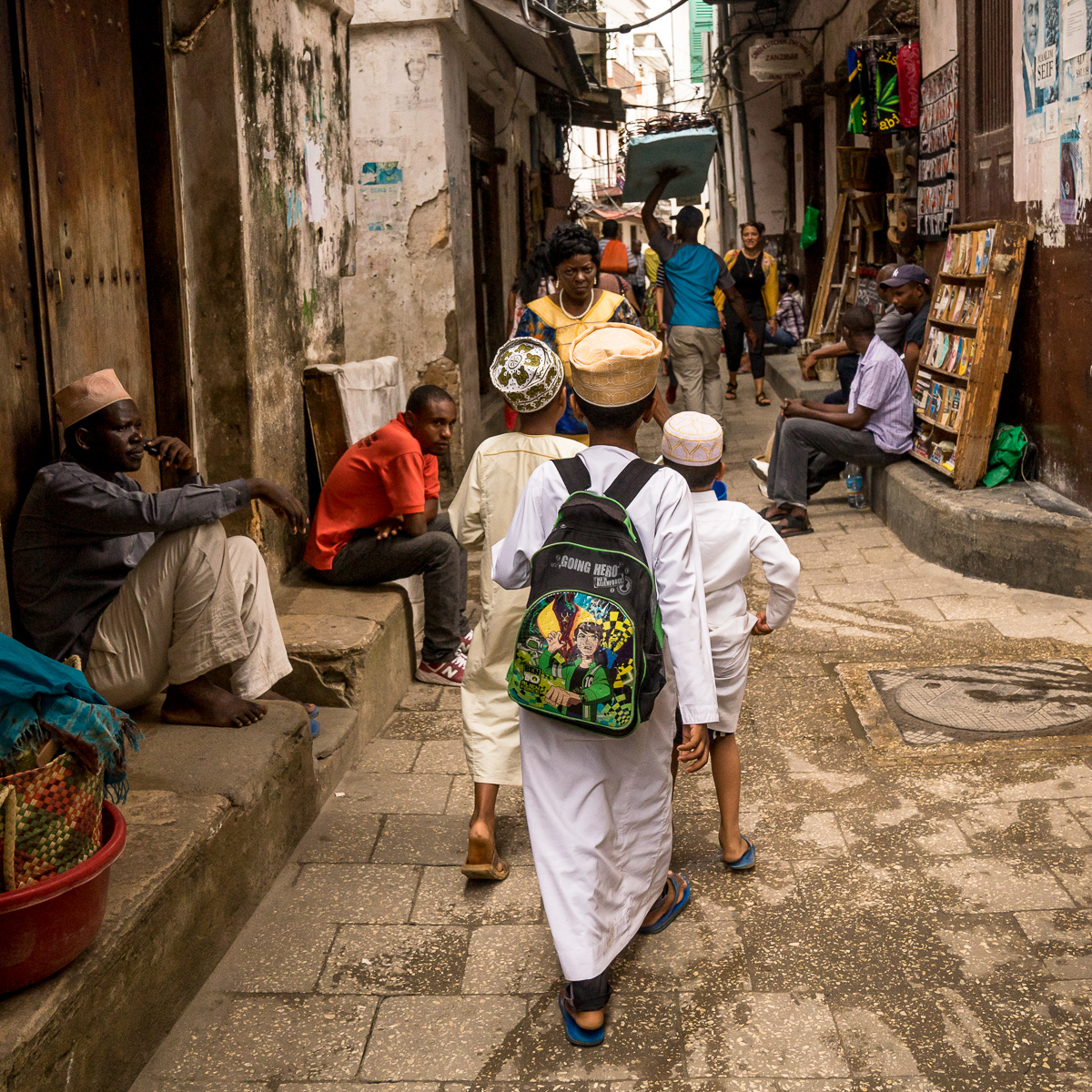
The heat lends all the necessary logic to their laziness
I’m not here in Zanzibar to be perverse, not officially at least. I’m here to cover Sauti za Busara, one of the prime music festivals in East Africa, founded in 2004 by an expat Brit by the name of Yusuf Mahmoud. From the tiny acorn of a single stage in what was then, according to Yusuf, the “dust bowl” of the Forodhani Gardens on the sea-front (now a lush and orderly municipal park), it has grown into three days of music from all over the African continent, staged with impeccable technical proficiency on two large paid-access stages within the old fort, and a free stage in Forodhani. This core is surrounded by a vital penumbra of fringe events, conferences and professional encounters, everything the discerning music-lover might expect from a fully-fledged music festival.
That the creation of this wonder cost thousands of man and woman-hours, oceans of patience and mountains of belief is to be expected. Yusuf looks like the kind of person to whom that kind of battle is the essential ingredient of a life well lived. As we talk, he brushes over his troubles with local bureaucracy, all the cultural misunderstandings, the patent shock in certain quarters that the festival should permit the beautiful Sufi rituals or zikri of the local dance troupe known as Maulidi ya Homu or the music that accompanies the female initiation rituals known as unyago, popularised by one of Zanzibar’s greatest contemporary artists, the late Bi Kidude, to be staged in front scantily clad tourists drinking beer. But like most festival directors the world over, Yusuf’s primary cause for insomnia is money, or rather the lack of it. There seems to be scant recognition in the local tourist industry that Sauti za Busara, which means “the voices of wisdom” in Swahili, has single-handedly extended Zanzibar’s tourist season by a whole month. Most of Sauti za Busara’s money comes from embassies in Dar es Salam, the lion’s share from the Norwegians, whose entire embassy staff have decided to take a mini-break to come and enjoy the festival this year.
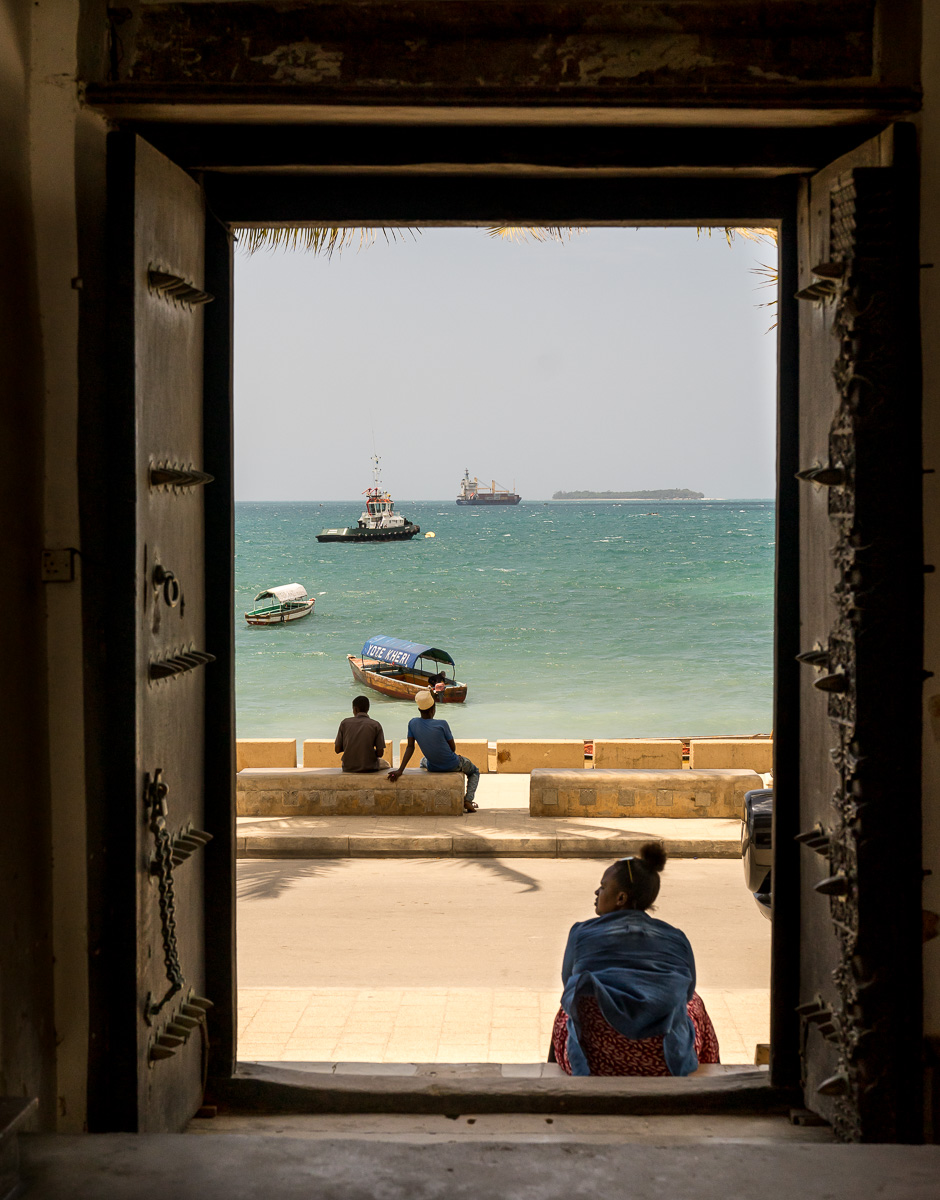 This non-committal local attitude towards culture has deep cultural roots. I take a stroll up the seafront to the Dhow Countries Music Academy (DCMA) (pictured right), a music school housed on two floors of the old customs house. Its many rooms and large balcony with wide views of the port, resound with the plink, scrape, bang and warble of nascent musical talent. The atmosphere is lively and raucous, with lots of laughter, singing and tomfoolery. My guide to the premises is fund-raising manager Aliko Mwakanjuki, a dancer and performer turned cultural administrator from the Tanzanian mainland. He looks like less of a bureaucrat and more of an artist-activist who’s used to operating at the grittier end of the cultural coal-face.
This non-committal local attitude towards culture has deep cultural roots. I take a stroll up the seafront to the Dhow Countries Music Academy (DCMA) (pictured right), a music school housed on two floors of the old customs house. Its many rooms and large balcony with wide views of the port, resound with the plink, scrape, bang and warble of nascent musical talent. The atmosphere is lively and raucous, with lots of laughter, singing and tomfoolery. My guide to the premises is fund-raising manager Aliko Mwakanjuki, a dancer and performer turned cultural administrator from the Tanzanian mainland. He looks like less of a bureaucrat and more of an artist-activist who’s used to operating at the grittier end of the cultural coal-face.
“We struggle here to get paying students who could sustain this college,” he says, “because anyone with money, the middle classes, they don’t think music is worth it. So we end up taking students from difficult backgrounds. We really save them from their lives, but we have to subsidise them. If music and art were respected, the way they’re respected in Europe, we have top-notch moneyed people sending their kids here.”
Aliko’s life story is a fine illustration of the problem. His father was the late Brigadier-General Adamo Mwakanjuki, one of the heroes of Tanzanian struggle for independence, senior figure in Tanzania’s ruling CCM party and close associate of the country’s founding father, President Julius Nyerere. When the young Aliko announced that he wanted to go to arts college to study traditional African music and dance, the response not only from his father, but also his own friends, was one of bafflement and consternation. “I was seen as a stupid young man who had lost his mind and wanted to do very stupid African things,” he says.
Aliko takes me to the room where this year’s embodiment of Swahili Encounters, an annual DCMA project that brings together musicians from all over Africa, are rehearsing for their Sauti za Busara show. South African trumpeter Mandla Mlangeni is standing in the middle of a circle conducting musicians from Kenya, Sudan, Egypt, Algeria and Tanzania (pictured below). The atmosphere is taut with the pressure of the looming show time. “Some of my friends are coming round now,” Aliko explains, continuing his story and we walk up the to the upper floor of the building, “It's down to embarrassment. They were embarrassed by their own culture. And that attitude comes from colonialism. It bought us Christianity and Islam and took away our culture. It told us our heritage wasn’t worth anything.” 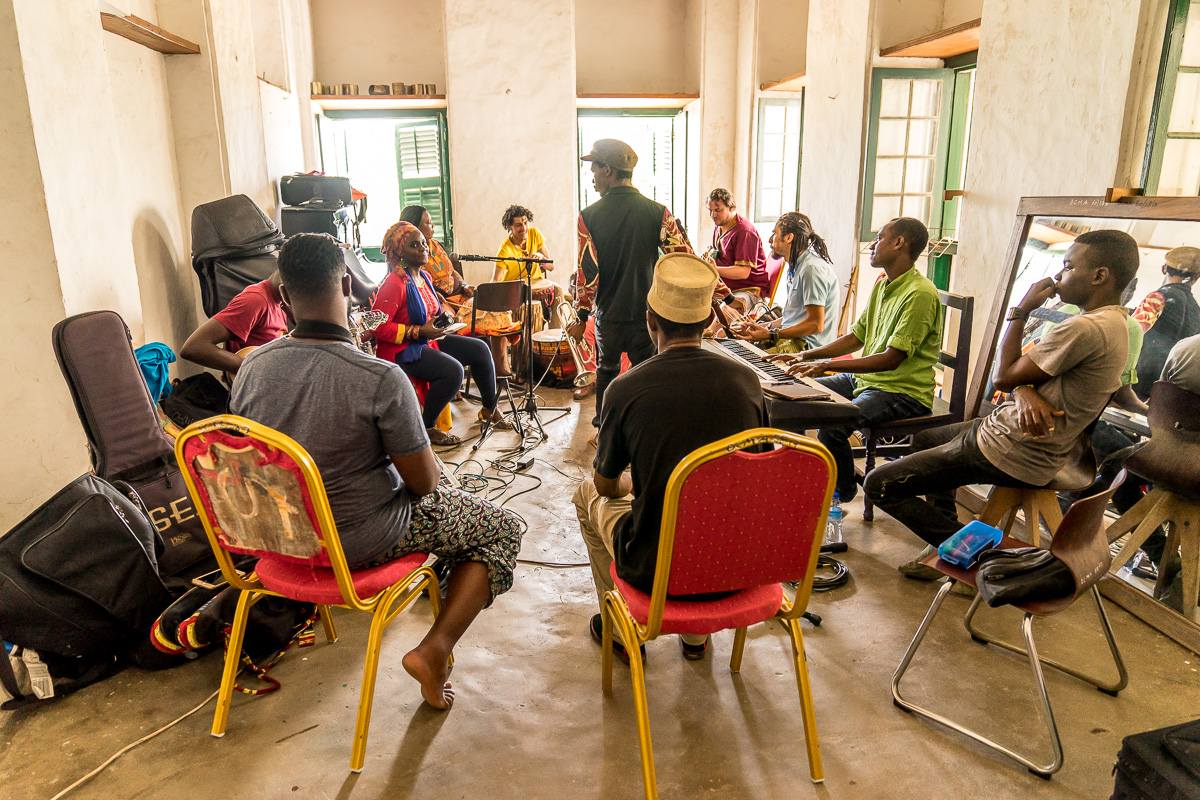 Later that evening, I have a long chat with a journalist from the Caribbean called Imani. He’s been living in Tanzania for over thirty years and shares Aliko’s feelings about the lack consideration, and money, given to local culture by wealthy local individuals. “As long as the locals see foreign organisations investing, they’ll say ‘It’s ok, they’ve got it covered,” he tells me. “Zanzibar isn’t being given the attention it deserves. It’s a place where people come, they take, but they don’t think about putting back. The majority of people here can’t even live a hand-to-mouth existence. This is the reality. And it’s only because they share the poverty, the African way, that it seems as if everybody’s happy. Because you have to be happy. If you’re not, you can just dig a hole and wait to die.” Later, as we’re walking to the old fort, he adds an afterthought: “The truth is that colonialism taught Africans to hate their own culture.”
Later that evening, I have a long chat with a journalist from the Caribbean called Imani. He’s been living in Tanzania for over thirty years and shares Aliko’s feelings about the lack consideration, and money, given to local culture by wealthy local individuals. “As long as the locals see foreign organisations investing, they’ll say ‘It’s ok, they’ve got it covered,” he tells me. “Zanzibar isn’t being given the attention it deserves. It’s a place where people come, they take, but they don’t think about putting back. The majority of people here can’t even live a hand-to-mouth existence. This is the reality. And it’s only because they share the poverty, the African way, that it seems as if everybody’s happy. Because you have to be happy. If you’re not, you can just dig a hole and wait to die.” Later, as we’re walking to the old fort, he adds an afterthought: “The truth is that colonialism taught Africans to hate their own culture.”
Colonialism taught Africans to hate their own culture
That hatred seems blissfully absent from the crowds that welcome the festival’s street parade into Forodhani gardens on the opening day. Youths in Man Utd and Nike swoosh t-shirts, mothers in hijab with babes and children, older men wearing their white kofia skull caps, younger men with rasta locks and batik shirts mingle with the tourists, dancing to the bongo flavabeats blaring from the sound systems, ogling the stilt-walkers and snapping photos of the small groups of kids in their traditional head-dresses. The atmosphere is festive, carefree, and yet measured and respectful. Just a crowd of Zanzibaris having a good time. Perhaps that’s part of the problem. “Local organisations or individuals, they don’t see the arts as profitable because they’re an intrinsic part of African life,” Imani Mané tells me, “so they’re just ‘ordinary’, in a way.”
Some young Masai men are demonstrating their famed watutsi leaps by the sea wall (pictured below), encircled by captivated mzungu ('white person'). The Masai are a curious presence here, and in most of East Africa by all accounts. Their toughness and legendary fighting abilities make them sought-after as security guards in hotels, shops or private villas, but they also coin the wonder of tourists who ask for their photo, or western women for whom a brief liaison with one of these lithe and lanky warriors is a thrill not to be missed. Some Zanzibaris I speak to see the Masai as the epitome of tourism’s corrupting influence, but a local rapper called Ison Mistari tells me they have it just about right, because wherever they go, even as far as Europe, they retain their dress, their dances, their language, their culture. You won’t see a Masai in a ‘Keep Calm and Go Shopping’ T-shirt.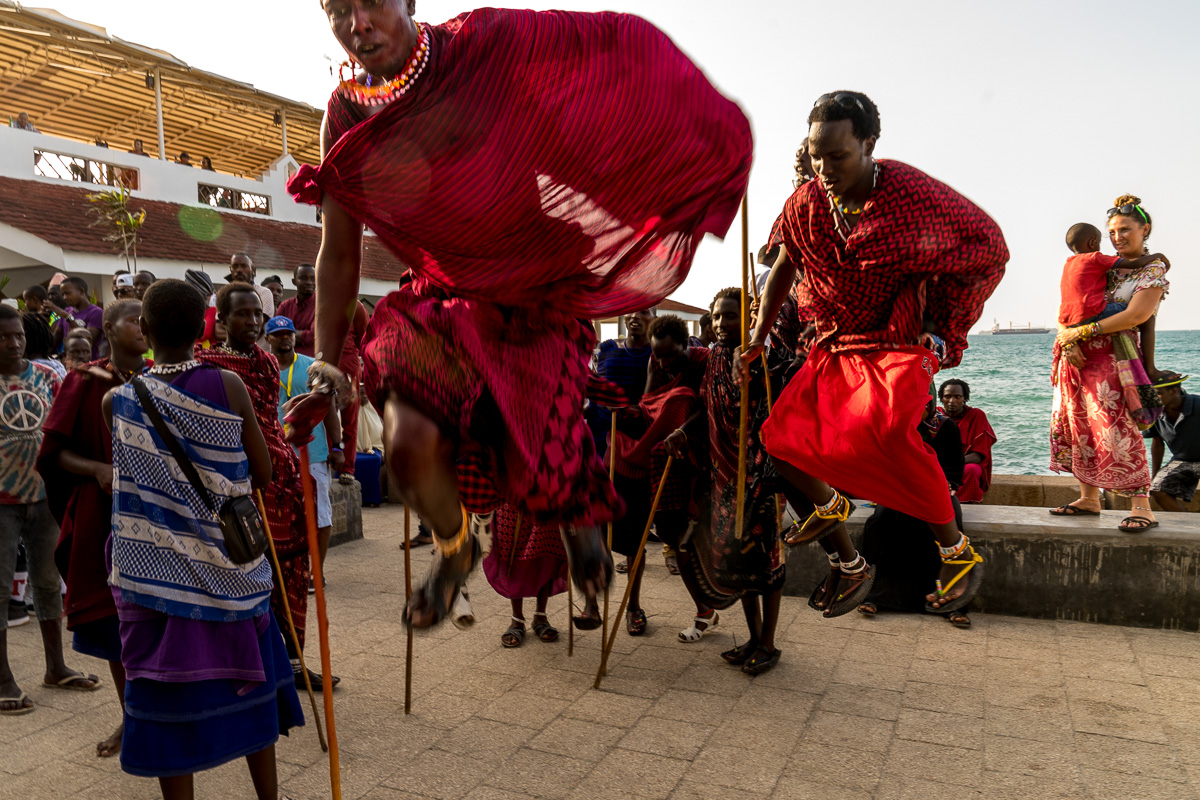 Across the alley from the entrance to my hotel - the gorgeous Emerson Hurumzi in the heart of Stone Town, founded by the late American ex-pat Emerson Dewey Skeens, a colourful and much-loved local grandee who could have stepped straight out of a novel by Graham Greene or Paul Bowles - my local street sage Imran, sits on his ‘throne’ (a wooden stool) dispensing snippets of wisdom and wit. One morning, fixing me with his mock-proud Shogun features, he tells me that “tourism is the enemy of culture.” I use this as the baseline for further enquiry. The economic benefits of tourism seem to be a matter of some contention. There are those who assert that the ordinary inhabitants of Unguja (the larger of the two main islands in the Zanzibar archipelago, the other being Pemba) don’t really benefit at all because most of the people working in the tourist industry are either mainlanders or Pembans. And those who invest in hotels and beach resorts are usually Middle Eastern, North American or European (the laundering of Italian mafia money on the island has long been one of the spicier sources of local gossip).
Across the alley from the entrance to my hotel - the gorgeous Emerson Hurumzi in the heart of Stone Town, founded by the late American ex-pat Emerson Dewey Skeens, a colourful and much-loved local grandee who could have stepped straight out of a novel by Graham Greene or Paul Bowles - my local street sage Imran, sits on his ‘throne’ (a wooden stool) dispensing snippets of wisdom and wit. One morning, fixing me with his mock-proud Shogun features, he tells me that “tourism is the enemy of culture.” I use this as the baseline for further enquiry. The economic benefits of tourism seem to be a matter of some contention. There are those who assert that the ordinary inhabitants of Unguja (the larger of the two main islands in the Zanzibar archipelago, the other being Pemba) don’t really benefit at all because most of the people working in the tourist industry are either mainlanders or Pembans. And those who invest in hotels and beach resorts are usually Middle Eastern, North American or European (the laundering of Italian mafia money on the island has long been one of the spicier sources of local gossip).
The problem isn't the tourists, the problem is us
But according to Aliko, this assessment misses the point entirely. “Take the tourists out, and what are the locals doing with their culture?” he says. “Nothing! I mean, DCMA itself depends on tourism. Our students go and perform in hotels on a weekly basis. Forty percent of our income comes from selling t-shirts and CDs, and who buys them? Tourists. The same goes for tickets to our concerts.” A local rapper called Ison Mistari also takes a positive view of Zanzibar’s largest economic sector: “Tourism isn’t the enemy of culture, because the problem isn’t the tourists; the problem is us. We copy too much, and we forget to remain ourselves. Most of the youth aren’t wearing their traditional clothes. Most of them speak Swanglishnow. But mostly it benefits us, because we can share experiences. I meet so much people from different places - Europe, America - it’s like I’m already travelling.”
To give Imran his due, the culture he’s referring to is that of the outlying villages, where the old staples of fishing or farming, with their back breaking graft and meagre financial reward, have a hard time attracting a younger generation who prefer to learn English, Italian or Russian and hustle tourists or find work in hotels, restaurants and NGOs. Even though at least one third of the islanders still scrape along in a state of grinding poverty, overall living standards have increased marginally in the past few decades. People can afford to build their huts from breeze blocks rather than palm fronds. But, according to Imran, they no longer have time to sit and listen and learn their culture. Children are no longer raised by the entire village. Village chiefs no longer administer justice. Kids are kept in line by the police and a flawed justice system. All of this damages cohesion, certainty and faith in the collective. People are too busy earning money and aspiring to something better. Always something better. They’re richer, but not necessarily happier. And there are less fish in the sea. So says Imran.
* * * * *
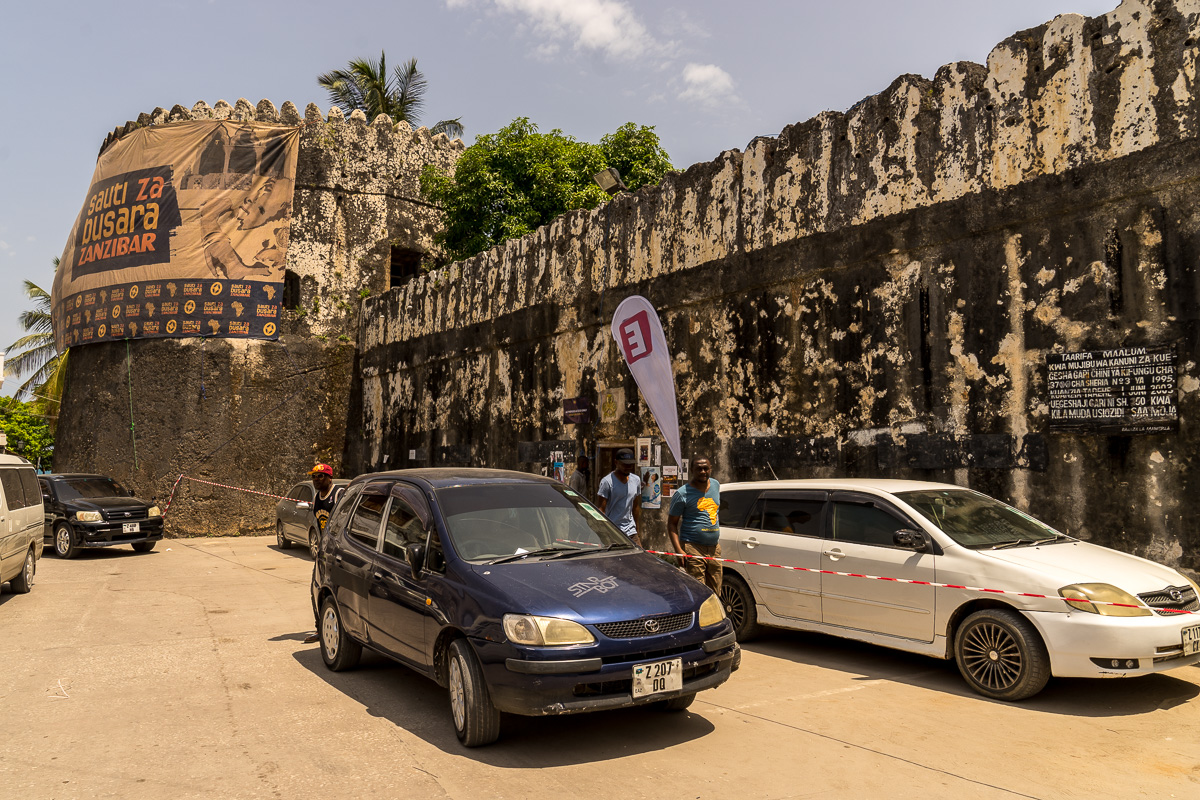 The old Arab fort, which has served as a prison, a railway terminal and a colonial ladies club in its time, appears at first sight to be the perfect festival venue. No need for a Glastonbury-style fencing when you have austere walls of solid stone ten metres high (pictured right). But its impregnable nature symbolises another highly contentious issue surrounding Sauti za Busara. Walk through the gatehouse at festival time, past the feverishly busy ticket desk, through the body scanners and you enter a world in which the racial mix encountered outside has been flipped on its head. Here the wazungu - the whiteys - are in the majority. “There’s a perception that the festival is only for tourists,” admits Yusuf. “But that’s never been our intention. We put a lot of effort into Swahili language promotion, in the press, on radio, TV and the internet. It’s very important for locals to see bands from other parts of Africa. But visitors also raise local perceptions of self-value. It’s like…why are they so interested in us? That’s important too.”
The old Arab fort, which has served as a prison, a railway terminal and a colonial ladies club in its time, appears at first sight to be the perfect festival venue. No need for a Glastonbury-style fencing when you have austere walls of solid stone ten metres high (pictured right). But its impregnable nature symbolises another highly contentious issue surrounding Sauti za Busara. Walk through the gatehouse at festival time, past the feverishly busy ticket desk, through the body scanners and you enter a world in which the racial mix encountered outside has been flipped on its head. Here the wazungu - the whiteys - are in the majority. “There’s a perception that the festival is only for tourists,” admits Yusuf. “But that’s never been our intention. We put a lot of effort into Swahili language promotion, in the press, on radio, TV and the internet. It’s very important for locals to see bands from other parts of Africa. But visitors also raise local perceptions of self-value. It’s like…why are they so interested in us? That’s important too.”
Without a deluge of sponsorship, Sauti za Busara could never offer free entry. And free entry, especially with alcohol generally available, would bring its own set of insoluble problems. Like everywhere else, the youth of Zanzibar need their release, and given a chance to go mental, they would gladly take it, with all the probable grief and violence that would entail. Such a scenario would never be allowed by the island’s guardians of order and moral probity. So what’s the right price? The question hangs unanswered in humid air, year after year. 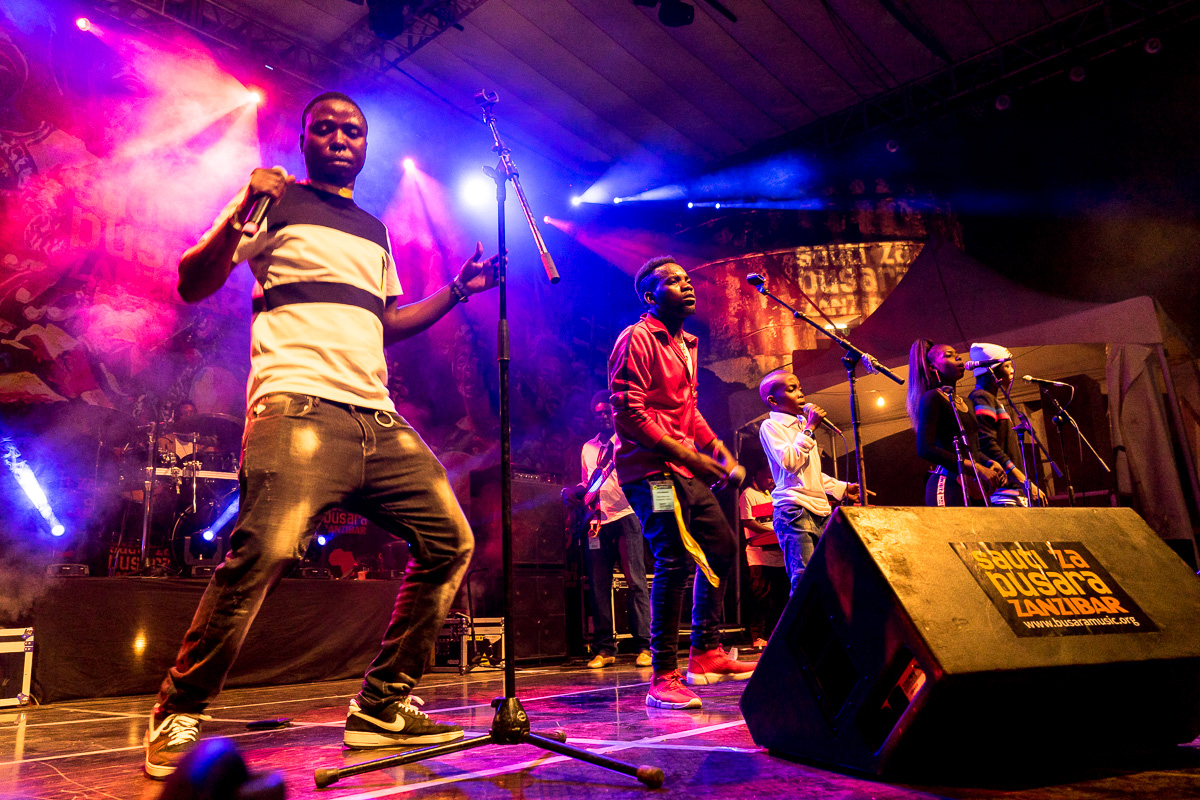
Like everywhere else, the youth of Zanzibar need their release
On the main stage a band from Dar-es-Salam called Mbukwa Na Wanawe Crew (pictured above) are cycling through an set of Afropop, rumba and bongo flava, the stomping Afro-disco hip hop sound that has dominated the Tanzanian charts for the past decade or so. Mbukwa are more of a collective than a band, with a long history of nurturing talent to stardom. The prime contender in this year’s line-up is a small boy by the name of Abdul ‘Dogo’ Kadry, whose vocal chords bring a young Smokey Robinson to mind and milk the audience of its reserves of cheers and applause. Mbukwa is what’s referred to locally as ‘hot’ music; its rhythmic, sexual and materialistic energy busts the thermostat, quickening the heartbeat of young zenjiboys and zenjigirls. It’s also the kind of music that the guardians of tradition categorise as a threat, a little too readily perhaps.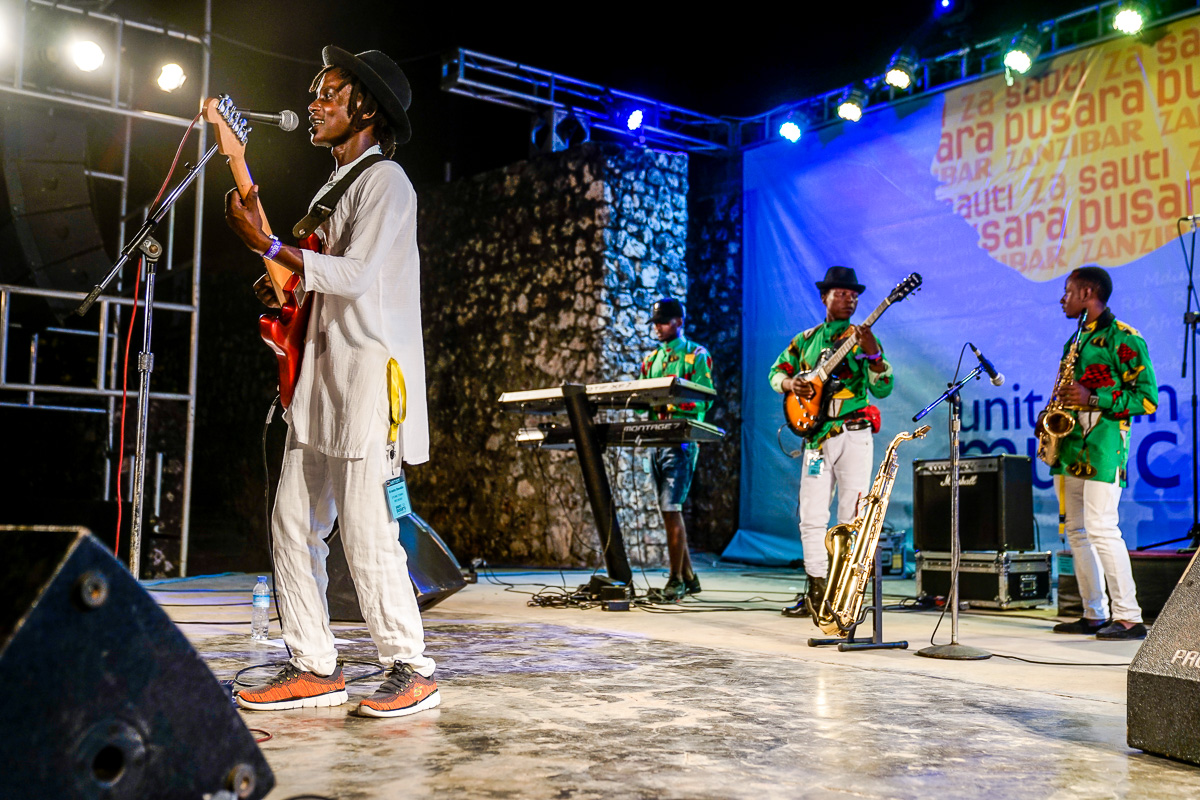 Stone Town Rockerz (pictured above), a band made up of young alumni from the DCMA, are a more sedate, more Zanzibari affair. They remind me of Mali’s famous orchestra, Les Ambassadeurs du Motel, in an old black and white TV clip I once saw - restrained, diffident and self-conscious in their matching green uniforms. The lead singer looks dapper in his white linen shirt and trousers, black Homburg and natty dreads, as he serves up his honey-soaked tunes straight from the poppier end of the Motown spectrum. The music feels light, easy, delightful, like the islands that gave it birth. The fashion designer Farooq Abdel, who trained in London and ran stalls in the Portobello Road and the Africa Centre in London before moving back to his native Zanzibar, tells me that “Zanzibaris are gentry.” He means it as a criticism. They won’t do menial jobs like clean the Zanzibaris are gentry streets, or work in bars. They feel that have the edge over the mainland in terms of sophistication, history and culture. Their blood is more restrained and that, in comparison to Mbukwa Na Wanawe, is also true of Stone Town Rockerz.
Stone Town Rockerz (pictured above), a band made up of young alumni from the DCMA, are a more sedate, more Zanzibari affair. They remind me of Mali’s famous orchestra, Les Ambassadeurs du Motel, in an old black and white TV clip I once saw - restrained, diffident and self-conscious in their matching green uniforms. The lead singer looks dapper in his white linen shirt and trousers, black Homburg and natty dreads, as he serves up his honey-soaked tunes straight from the poppier end of the Motown spectrum. The music feels light, easy, delightful, like the islands that gave it birth. The fashion designer Farooq Abdel, who trained in London and ran stalls in the Portobello Road and the Africa Centre in London before moving back to his native Zanzibar, tells me that “Zanzibaris are gentry.” He means it as a criticism. They won’t do menial jobs like clean the Zanzibaris are gentry streets, or work in bars. They feel that have the edge over the mainland in terms of sophistication, history and culture. Their blood is more restrained and that, in comparison to Mbukwa Na Wanawe, is also true of Stone Town Rockerz.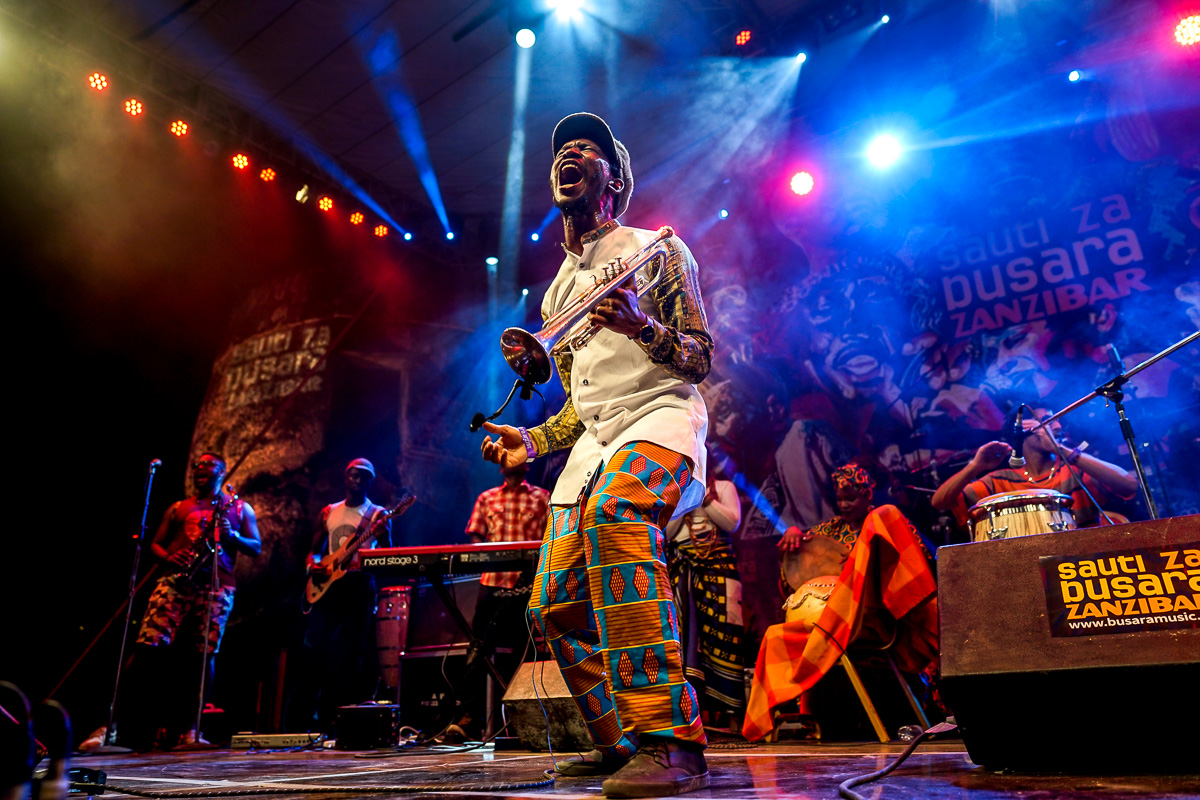 Swahili Encounters (pictured above), whom I saw running through their set at DCMA in a state of pre-gig neurosis, deliver the epitome of supra-national musical oneness - a flowing Indian Ocean gumbo of jazz, Egyptian taarab, Algerian chaabi, Township swing, Sudanese pop - so many far-flung strands, mashed up by history and united in music. For a four-day preparation period, the results are highly impressive. Jackie Akello from northern Uganda is a gracefully luminous presence on the fort’s second amphitheatre stage, as she tells the audience of the civil war that blighted her homeland in northern Uganda and inspired so many of her songs. But somehow that depth of feeling, that fragility, isn’t borne out by the rather bland and ‘rote’ sound produced by her white-clad band, several of whom fashion the funkiest afros I’ve seen in a while. The audience love it nonetheless, and turn the space in front of the low stage into an hip-grinding African-style mosh pit.
Swahili Encounters (pictured above), whom I saw running through their set at DCMA in a state of pre-gig neurosis, deliver the epitome of supra-national musical oneness - a flowing Indian Ocean gumbo of jazz, Egyptian taarab, Algerian chaabi, Township swing, Sudanese pop - so many far-flung strands, mashed up by history and united in music. For a four-day preparation period, the results are highly impressive. Jackie Akello from northern Uganda is a gracefully luminous presence on the fort’s second amphitheatre stage, as she tells the audience of the civil war that blighted her homeland in northern Uganda and inspired so many of her songs. But somehow that depth of feeling, that fragility, isn’t borne out by the rather bland and ‘rote’ sound produced by her white-clad band, several of whom fashion the funkiest afros I’ve seen in a while. The audience love it nonetheless, and turn the space in front of the low stage into an hip-grinding African-style mosh pit.
* * * * *
Zanzibar has always been a base-camp, a haven, a secure destination where the anxious traveller can experience Africa without actually being in Africa. It still feels that way. That’s why it came as a surprise when Yusuf told me that the festival had to be cancelled in 2016, due to the tense political atmosphere and latent threat of unrest. The reason was the disputed elections of October 2015 which, as every election has since the advent of multi-party democracy to the islands in 1995, pitted the ruling CCM party against the ‘nationalist’ CUF. These two parties sit at the opposite ends of a deep bi-polar rift: Zanzibar’s Tory and Labour, Republican and Democrat, Montague and Capulet. The CCM have ruled Tanzania since it won independence from the British in 1961. The CUF was created in 1992 by a group of disaffected CCM cadres from Zanzibar, predominantly from the island of Pemba. They wanted change. They wanted a better deal for Zanzibar. Many of them wanted, and still want, independence from the rest of Tanzania. 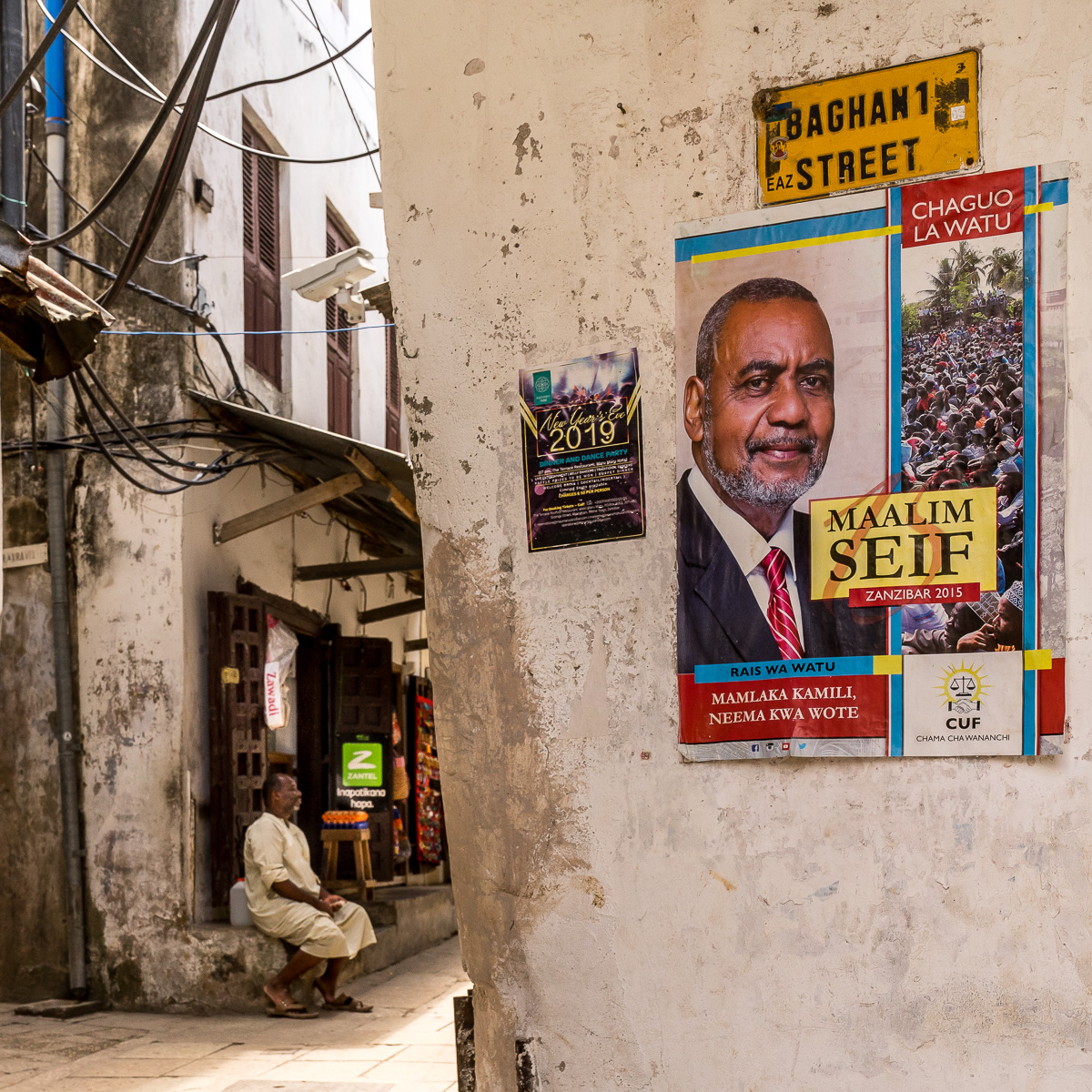 The official line on the CCTV cameras that dot the corners and alleyways of Stone Town (pictured above) is they’ve there for the security of tourists. But the savvier word says their purpose is to give the army and police eyes on the street in case of major civil unrest. The CCM has won every election since 1995, but the CUF claim that most of them have been fraudulent, and that they have been the true winners. Their patience is running out. The CCM fear that a CUF win would lead to a break-up of the union that has bound Tanzania together since April 1964. The stakes couldn’t be higher.
The official line on the CCTV cameras that dot the corners and alleyways of Stone Town (pictured above) is they’ve there for the security of tourists. But the savvier word says their purpose is to give the army and police eyes on the street in case of major civil unrest. The CCM has won every election since 1995, but the CUF claim that most of them have been fraudulent, and that they have been the true winners. Their patience is running out. The CCM fear that a CUF win would lead to a break-up of the union that has bound Tanzania together since April 1964. The stakes couldn’t be higher.
Political violence is nothing new on these gentle islands. Shortly after independence from the British, in January 1964, the Sultan of Zanzibar was overthrown in a spontaneous uprising, which was followed by a massacre of the island’s white population – Arabs, south Asians and Comorians. It’s an event that has been referred to by the historian Thomas Burgess as ‘either the original sin, or triumph’ (depending which side you’re on) of the independence era. The only documentary evidence of the massacres that survives is the footage shot from an Italian plane that overflew the island during that bloody fortnight. Long lines of men, women and children, clad in traditional white robes can be seen marching like ants to their deaths, their faces turned skyward in vain hope. White bodies lie piled in mass graves. Beaches are littered with the dead.
Political violence is nothing new on these islands
The outside world knew little of all this horror at the time. Ryszard Kapuscinski was one of the first journalists to reach Zanzibar after January 12th, but he spent most of his time drinking beer in the bar next to his hotel and lying in bed trying to overcome a fever. He reported that all seemed “quiet and sleepy” in Stone Town. It wasn’t his finest hour. Estimates of the numbers killed during those few weeks in January 1964 range between eight and thirteen thousand. Up to 100,000 Zanzibaris, including most of the island’s experienced teachers, doctor, nurses, engineers, agriculturalists and administrators, fled immediately, or in the ensuing months and years. Among them was a young seventeen-year old Parsee of Indian descent by the name of Farooq Busara, who moved with his parents to the exotic streets of Middlesex. Eleven years later his band released a song called ‘Bohemian Rhapsody’ and the rest is history (the irony that Zanzibar’s most famous son was a flamboyantly gay rock star is not lost on the more liberal-minded members of this conservative society).
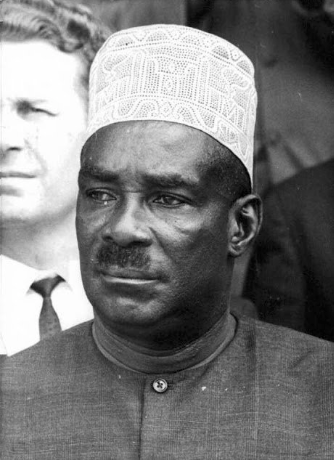 Zanzibar's new president Abeid Karume (pictured right) and his Revolutionary Council did everything in its power to Africanise and socialise Zanzibar. Land was nationalised. Property and businesses were confiscated by the state. Symbols of privilege were destroyed. Taarab music, that quintessentially Zanzibari mix of Egyptian orchestral music and local rhythmic flavours and lyrics, was banned for while for being too alien, too Arab, even though no other style of music has come closer to encapsulating the soul of these islands. Western films, hairstyles, dances and music were banned for being ‘imperialist’, along with cosmetics, skin cream, long nails, wigs, miniskirts, bell-bottoms, Afros, cat pants and Jackson 5 caps.
Zanzibar's new president Abeid Karume (pictured right) and his Revolutionary Council did everything in its power to Africanise and socialise Zanzibar. Land was nationalised. Property and businesses were confiscated by the state. Symbols of privilege were destroyed. Taarab music, that quintessentially Zanzibari mix of Egyptian orchestral music and local rhythmic flavours and lyrics, was banned for while for being too alien, too Arab, even though no other style of music has come closer to encapsulating the soul of these islands. Western films, hairstyles, dances and music were banned for being ‘imperialist’, along with cosmetics, skin cream, long nails, wigs, miniskirts, bell-bottoms, Afros, cat pants and Jackson 5 caps.
Karume was assassinated in April 1972, while he was playing the local game of bao at the headquarters of the Afro-Shirazi Party in Stone Town. It was the 17th coup attempt of his presidency. So much for that dream of an African and socialist Zanzibar. There’s no doubt that many ordinary Africans did benefit from the revolution and remain grateful for its redistribution of wealth and power. Nor is there any doubt that the revolution left the social bonds that had underpinned Zanzibari society for centuries, and its much-vaunted cosmopolitanism in tatters. Even though Zanzibar joined together with Tanganyika to form the Republic of Tanzania in April 1964, the questions posed by the revolution are still open and potent: Is Zanzibar fundamentally African, a satellite of the mainland, or does it have its own character, fed as much by its historic links with distant lands that lie across the oceans as by its links to the continent that lies forty kilometres from its shores? Is Zanzibar exceptional, and does it have the right to be treated differently? These questions are at the very heart of the political strife between CCM and CUF.
* * * * *
BCUC connect with the local zenji boys and zenji girls like a power station hooking up to the national grid
The performance by Soweto’s BCUC on the free stage in Forodhani gardens in the dying light of late afternoon is the undisputed highlight of this year’s festival. With its pounding phalanx of drums and pumping bass, the BCUC rhythm section is revolutionary force all of its own. When topped with the heaven-and-hell preacher holler of the band’s extraordinary front man Zithulele Zabani Nkosi, aka ‘Jovi’, that force is doubled and re-doubled. The band connect with the local zenji boys and zenji girls like a power station hooking up to the national grid. The effect is joyous frenzy, a long awaited riot, a black riot, all of their own. Even more extraordinary, given that 90% of the audience understand barely a word of English, is the sheer quality of the discourse that Jovi imparts with his ferocious yelps and hollers. It’s as if he’s spent the past week reading up on Zanzibar, the real Zanzibar behind the pretty exotic face: “Don’t fight! Be kind to one another! Keep respecting these islands! These buildings! These waters! This earth! And we will learn to respect you! White people, you can help, because you have a voice. But don’t speak for us, because we can speak for ourselves! Some of us don’t love ourselves as much we should! As much as we love them. Our beautiful ancestors, who were taken away from us, across the sea!” I get too distracted taking pictures, drinking in the frenzy, to write much more than that in my notebook. The rest of it was even better. 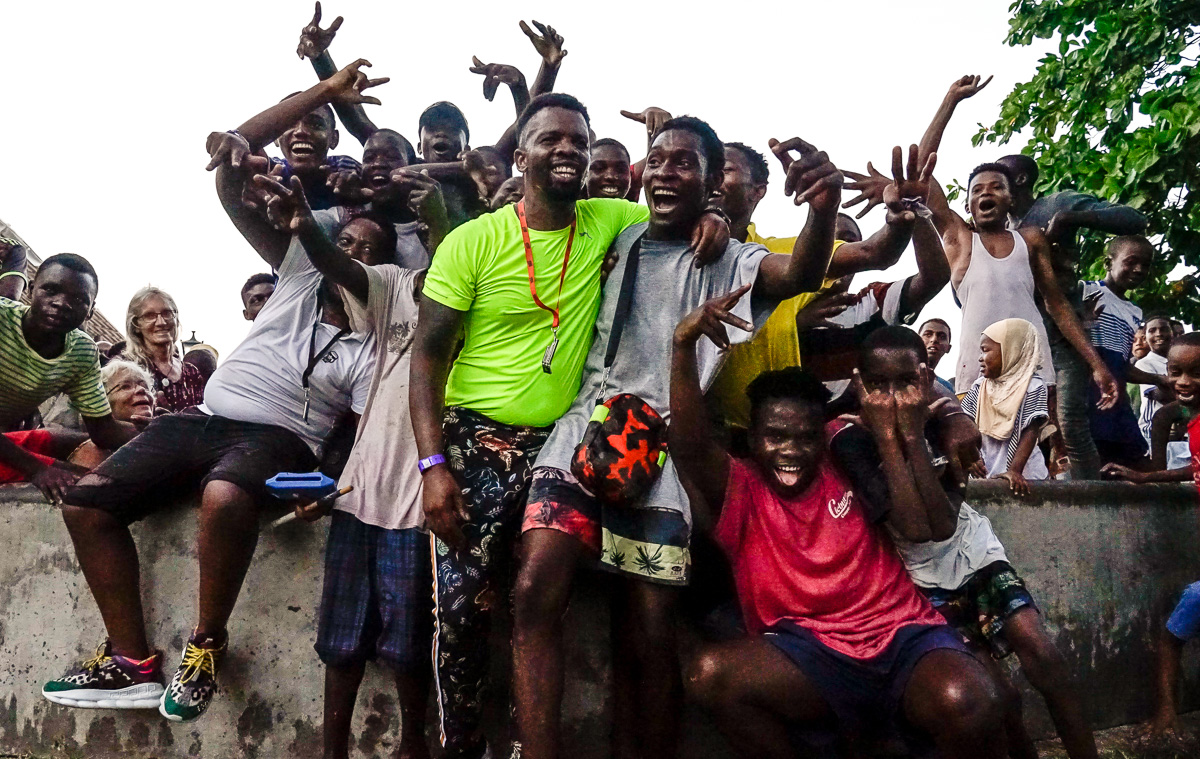 At the end of show, Jovi and backing vocalist/whistle player Letihongonolo Maphunye leap down from the stage and are devoured by an explosively happy mob of local youth (pictured above). This is their moment of release from all the dragnets of their daily lives: the joblessness and lack of cash, the moralising parents and imams, the political bickering, the impossible dreams of wealth and ease and sex that are piped into their lives via their mobile phones, the tempting gateways to oblivion - beer, kunyago (a local gin-like hooch), ganja, cocaine and smack - the sight of so many mzungu living like the Sultans of old in their midst, the desperation and hopelessness. They know that BCUC understand them, and they repay that understanding with unbridled joy and gratitude.
At the end of show, Jovi and backing vocalist/whistle player Letihongonolo Maphunye leap down from the stage and are devoured by an explosively happy mob of local youth (pictured above). This is their moment of release from all the dragnets of their daily lives: the joblessness and lack of cash, the moralising parents and imams, the political bickering, the impossible dreams of wealth and ease and sex that are piped into their lives via their mobile phones, the tempting gateways to oblivion - beer, kunyago (a local gin-like hooch), ganja, cocaine and smack - the sight of so many mzungu living like the Sultans of old in their midst, the desperation and hopelessness. They know that BCUC understand them, and they repay that understanding with unbridled joy and gratitude.
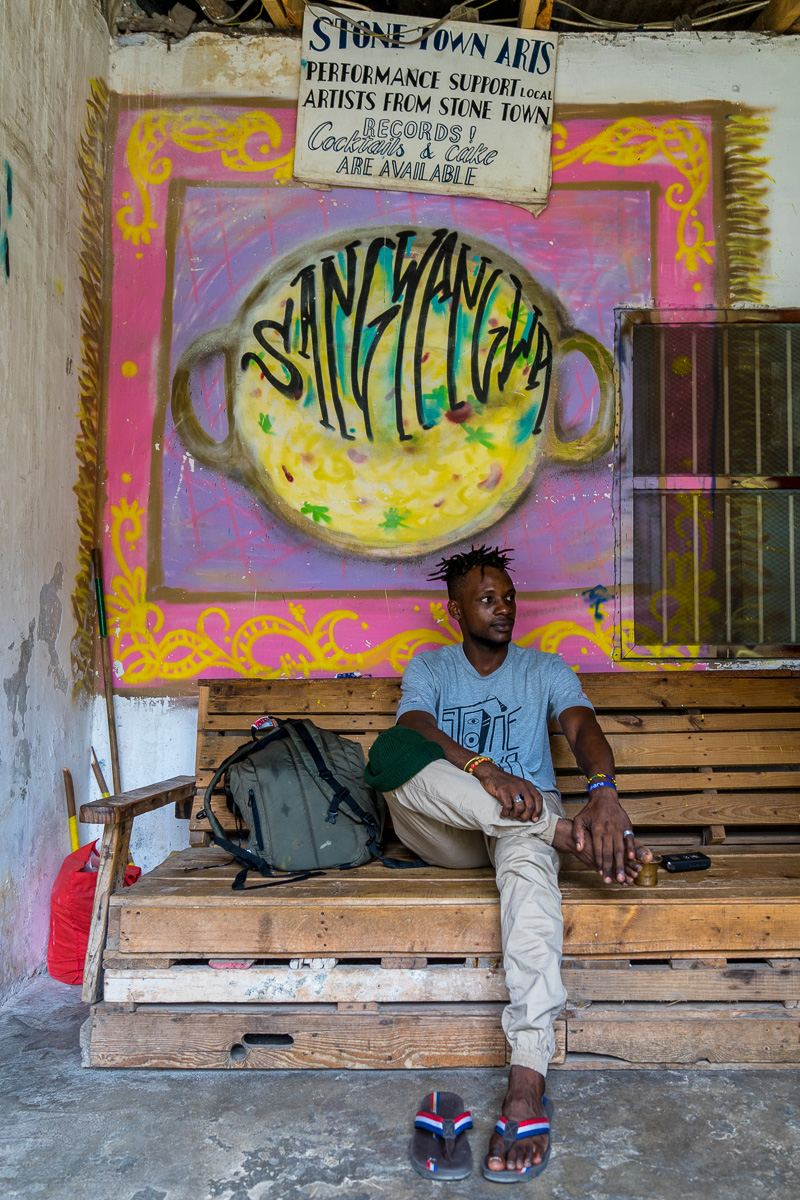 One clear blue morning, I’m taken through the warren of alleyways outside my hotel to a dilapidated old house, up a flight of rickety wooden stairs, and out onto an terraced covered with carefully tended plants and surrounded on three sides by small apartments. One of them is the home of Stone Town Records, the only record label and recording facility on Zanzibar worthy of the name. The studio is situated across the way, in a tiny two room space that was once the living quarters of Nasri, the brother of Kassim Omar, aka Mash (pictured below), one of the studio’s co-founders. Mash launched the project with a German producer and former student of African history by the name of Lorenz Herriman, using the proceeds of a cocktail bar that the pair ran at one of the editions of Sauti za Busara, which netted them about $2,500 in three days. The label’s motto is ‘Community, Connection, Creativity’ and its approach is radically DIY.
One clear blue morning, I’m taken through the warren of alleyways outside my hotel to a dilapidated old house, up a flight of rickety wooden stairs, and out onto an terraced covered with carefully tended plants and surrounded on three sides by small apartments. One of them is the home of Stone Town Records, the only record label and recording facility on Zanzibar worthy of the name. The studio is situated across the way, in a tiny two room space that was once the living quarters of Nasri, the brother of Kassim Omar, aka Mash (pictured below), one of the studio’s co-founders. Mash launched the project with a German producer and former student of African history by the name of Lorenz Herriman, using the proceeds of a cocktail bar that the pair ran at one of the editions of Sauti za Busara, which netted them about $2,500 in three days. The label’s motto is ‘Community, Connection, Creativity’ and its approach is radically DIY.
“We had a lot of problems setting up the studio,” Mash tells me. ”One of the neighbours is very conservative. Doesn’t like our movement. He complained, and the regional commissioner came round with the police, saying we’re selling drugs, we’re gangsters. But he listened, he understood. He saw the garden we’ve created. He was amazing.”
The place where music, creative freedom and Islam meet is a something of battleground for local musicians. Mash doesn’t consider them to be naturally antagonistic to each other, or mutual exclusive. “People love taarab, even if they pray. But some have this idea that music is haram. It depends on how you do it. If you’re gonna play just for drunk people, just to shake your ass and shit, then yes, it’s haram. Even for me. Because you’re not spreading any education. That’s why people in Zanzibar love reggae. They pray five times a day, but back home they still listen to Bob Marley, because they learn from that. Zanzibar people love good music, with education, and inspiration. Music that’s entertainment only isn’t for us. It’s for the mainland.”
They pray five times a day but back home they still listen to Bob Marley
Ison the rapper (pictured above) is one of the stars of the Stone Town Records roster, with several local hits to his name. But, like many of the musicians I meet, he’s categorical about the need for music to be relevant, conscious, devoid of the bling, bitches and bottles of Dom Perignon that encrust so much ‘urban’ African pop. “In my lyrics I write reality. Our heart. Our real life that we live every day,” he tells me as we sit together under the Stone Town Records logo. “Because some musician they just pretend…like ‘we’re famous now.’ Last year I got a trophy at the Zenji 255 awards, and some of my songs are at the top of the charts, but I’m still using local transport. Sometimes I hang around all day with no money. So this is my life.”
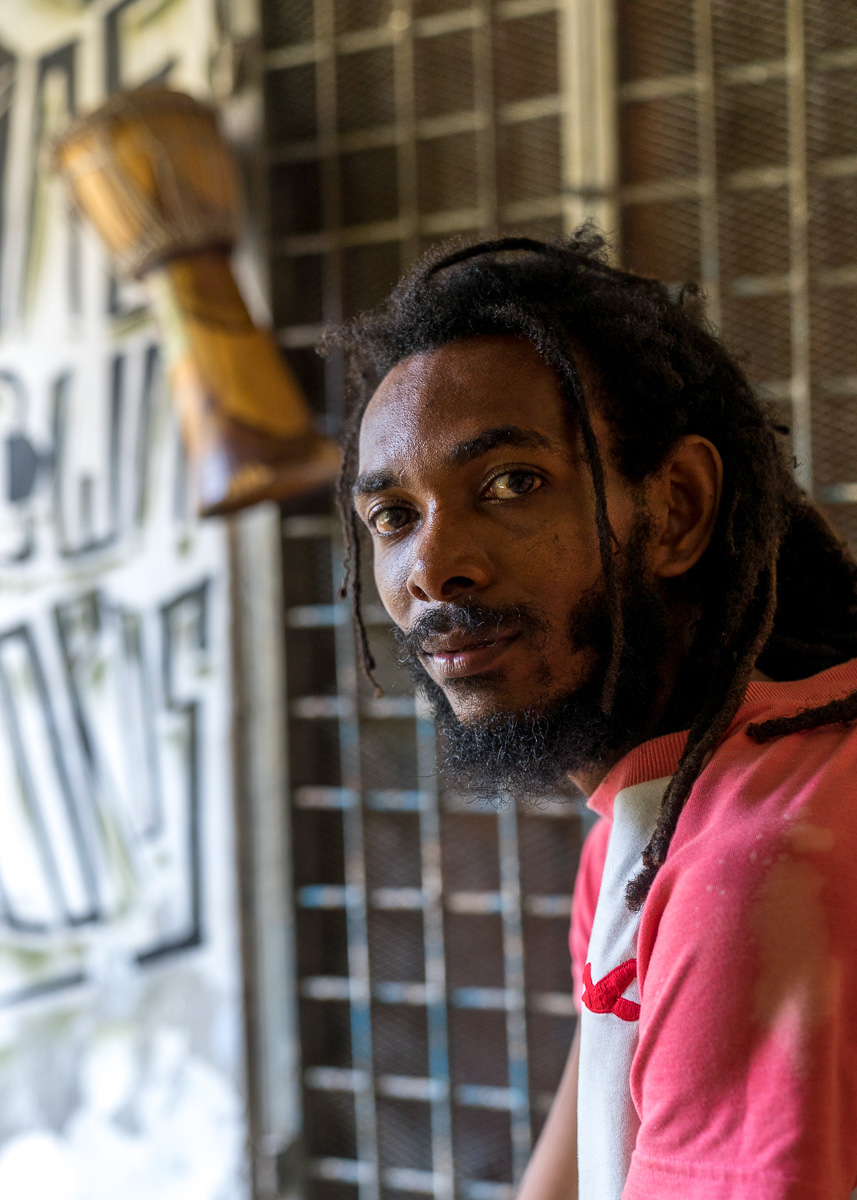 This desire to embrace real life and put it at the heart of creative process informs the DIY spirit behind Stone Town Records. ”Many people are jobless here,” says Ison, “ but it’s their own fault a lot of the time. They don’t wanna wake up, face reality and take the opportunities. They’re just waiting for the government. But I think, to change your life, it’s you first, then other people can support you. That’s why we did a community studio. We come together, we’re doing our stuff, we have somebody who print T-shirts, somebody who does the videos, somebody singing, playing instruments, producing. So if there are opportunities, we can have them, because we got together and we’re doing, without waiting for anyone to come and help us. Most people want the shortcut way. Go to sleep and wake up rich. It’s not like that.”
This desire to embrace real life and put it at the heart of creative process informs the DIY spirit behind Stone Town Records. ”Many people are jobless here,” says Ison, “ but it’s their own fault a lot of the time. They don’t wanna wake up, face reality and take the opportunities. They’re just waiting for the government. But I think, to change your life, it’s you first, then other people can support you. That’s why we did a community studio. We come together, we’re doing our stuff, we have somebody who print T-shirts, somebody who does the videos, somebody singing, playing instruments, producing. So if there are opportunities, we can have them, because we got together and we’re doing, without waiting for anyone to come and help us. Most people want the shortcut way. Go to sleep and wake up rich. It’s not like that.”
In most of my posts I write Zanzibar Moja! It means 'Zanzibar is one'
I ask Ison what he considers to be the biggest problem facing local youth. “Politics,” he answers, without hesitation. “I want to try and take people away from this politics that divides them. In most of my posts online I write Zanzibar Moja! It means ‘Zanzibar is one!’ No Pemba, no Unguja, just Zanzibar. Forget about CCM, forget about CUF, let’s be Zanzibaris! That’s my ambition now. I know people won’t be happy, but I don’t care. This is what Zanzibar has been missing from hip hop artists. Because most of them they just talk about love, and sex and all that bullshit.”
* * * * *
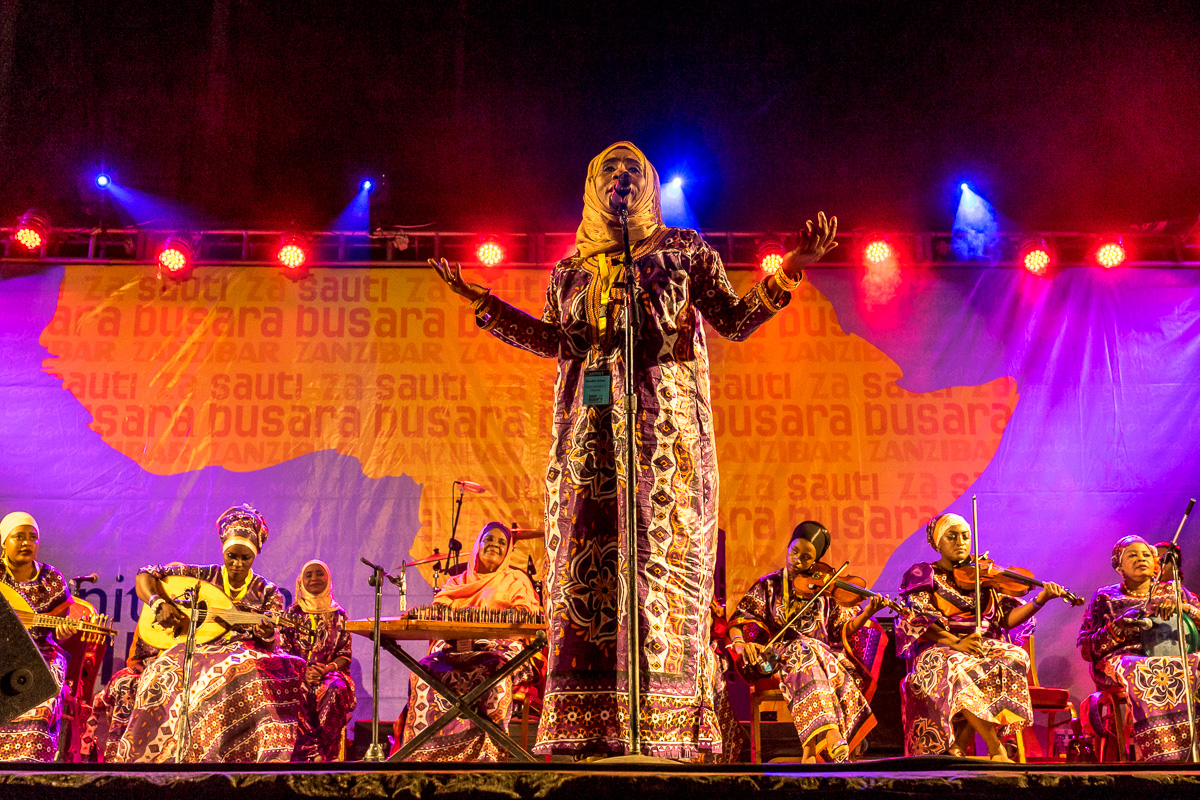 The sight of the sixteen-piece Tausi Women’s Taarab orchestra in full sail (picture above) on the old fort’s amphitheatre stage is a shocking, if pleasant surprise. On several counts. First it confirms the renaissance of Zanzibar’s most ancient and revered musical tradition, whose roots date back to the 1870s when the second Sultan Sayyid Barghash bin Said (pictured below) sent a talented young musician called Mohammed Ibrahim to Egypt to study the classical Arab orchestras who played what was known in Arabic as taarab. He bought it back to Zanzibar where it slowly percolated down the social pyramid, picking up local rhythms, colourings and Swahili texts along the way. By the 1950s there were taarab orchestras in almost every major village and town on the island, and many more in Stone Town. They included large female taarab vocal groups, with names such as
The sight of the sixteen-piece Tausi Women’s Taarab orchestra in full sail (picture above) on the old fort’s amphitheatre stage is a shocking, if pleasant surprise. On several counts. First it confirms the renaissance of Zanzibar’s most ancient and revered musical tradition, whose roots date back to the 1870s when the second Sultan Sayyid Barghash bin Said (pictured below) sent a talented young musician called Mohammed Ibrahim to Egypt to study the classical Arab orchestras who played what was known in Arabic as taarab. He bought it back to Zanzibar where it slowly percolated down the social pyramid, picking up local rhythms, colourings and Swahili texts along the way. By the 1950s there were taarab orchestras in almost every major village and town on the island, and many more in Stone Town. They included large female taarab vocal groups, with names such as 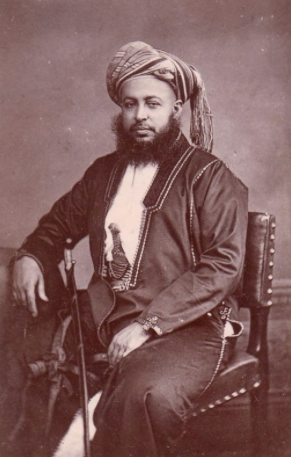 ‘Royal Navy’ or ‘Royal Air Force’. But all that disappeared after the revolution. When I was last in Zanzibar, back in 1997, the taarab tradition was wilting under accumulated layers of dust and neglect. Only a few orchestras and taarab ‘clubs’, modelled on the old English gentlemen’s club, were still active. Political patronage, which had been a mainstay in taarab’s golden age, was almost gone. One of the rare female orchestra leaders at the time told me “on my thinking, taarab is dying.” Well it has evidently been resuscitated. The number of under thirty-year-olds in the Tausi orchestra (the name means ‘peacock’), the sight of young people scratching away patiently at violins during my visit to the DCMA (even Ison has taken up the instrument), are all proof of the genres’ renewed vigour. The role that Sauti za Busara and the DCMA have played in this renaissance is self-evident.
‘Royal Navy’ or ‘Royal Air Force’. But all that disappeared after the revolution. When I was last in Zanzibar, back in 1997, the taarab tradition was wilting under accumulated layers of dust and neglect. Only a few orchestras and taarab ‘clubs’, modelled on the old English gentlemen’s club, were still active. Political patronage, which had been a mainstay in taarab’s golden age, was almost gone. One of the rare female orchestra leaders at the time told me “on my thinking, taarab is dying.” Well it has evidently been resuscitated. The number of under thirty-year-olds in the Tausi orchestra (the name means ‘peacock’), the sight of young people scratching away patiently at violins during my visit to the DCMA (even Ison has taken up the instrument), are all proof of the genres’ renewed vigour. The role that Sauti za Busara and the DCMA have played in this renaissance is self-evident.
Secondly, sixteen women sitting on a stage, not only singing but playing violins, qanouns, percussion, accordions, no men in sight, is a vision so startling in the context of 21st century Zanzibar, that it deserves a little explanation. The Tausi orchestra was formed by the 75 year-old Mariam Hamdani, a former minister in the Zanzibar government who used her pension to buy instruments and pursue the goal of an all-female ensemble. She did this in defiance of conservative imams and recalcitrant husbands and family members who deem music, especially instrumental music, to be ‘un-Islamic’. Even the threat of having all the orchestra’s instruments confiscated and burned hasn’t deterred Hamdani. She has written songs about the hypocrisy of the puritanical sheikhs and intends to take the orchestra on a tour of the village to engage with communities on issues surrounds women’s rights, and the abuse of women and children.
As their concert progresses, the Tausi women lose their prescribed reserve and begin to dance, smile, laugh, shimmy and spin. In one piece they act out a local wedding ritual in which the female friends and relatives of the bride gather together to give her the gifts that will equip her house and her wardrobe for married life (pictured below). At this point the show enters its most raucous phase, with the woman playing the bride standing on a chair, shoulder-shaking, hip-trembling and whooping as she displays her gifts for all to see, her friends frolicking around her. The impression is of an almost ecstatic female joy, that remains ‘safely’ stowed most of the time, but occasionally, when there’s strength in numbers or tradition permits it, comes out, hungry for release. 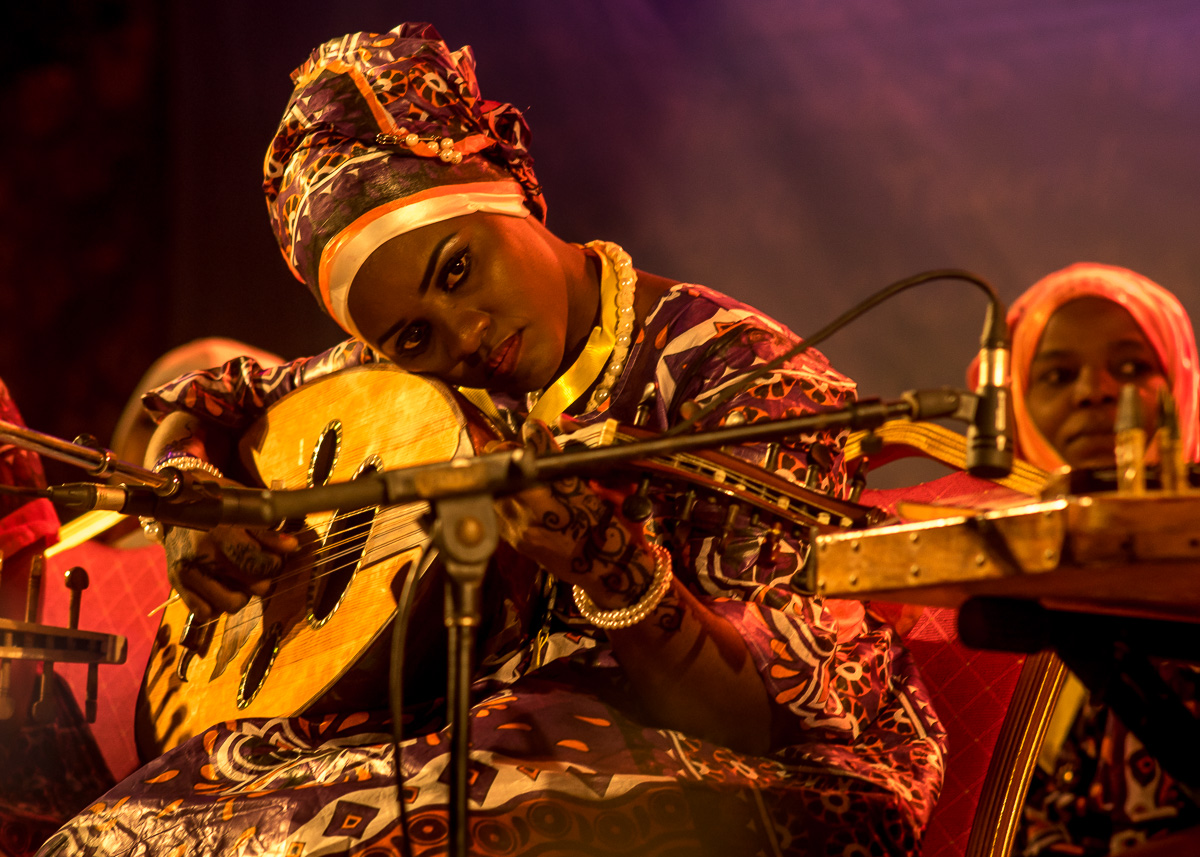
The impression is of an almost ecstatic female joy
Though Zanzibar has so far been spared the horror of a major jihadi attack, the forces of conservatism and puritanical extremism have been gathering strength over the past decade. There are no overtly Wahabi or Salafi mosques on the island but the drift towards extremes has been reinforced by rich donors from Saudi Arabia and the Gulf states, who invest in private schools that teach a conservative Wahabi-inspired Islam. The more traditional madrassas, which are often run by volunteer teachers and propagate an older, Sufi-inspired strand of faith, find it hard to offer the same quality of education and are loosing out to the private schools. Everything that comes from Saudi Arabia and the Gulf, the land of the holy sites, including wealthy Arabs indulging in a spot of high-end rest and recreation, tends to be revered almost blindly. Gulf money also funds religious associations, that have become adept at spreading their puritanical faith on the radio, on the web, and via recorded sermons. 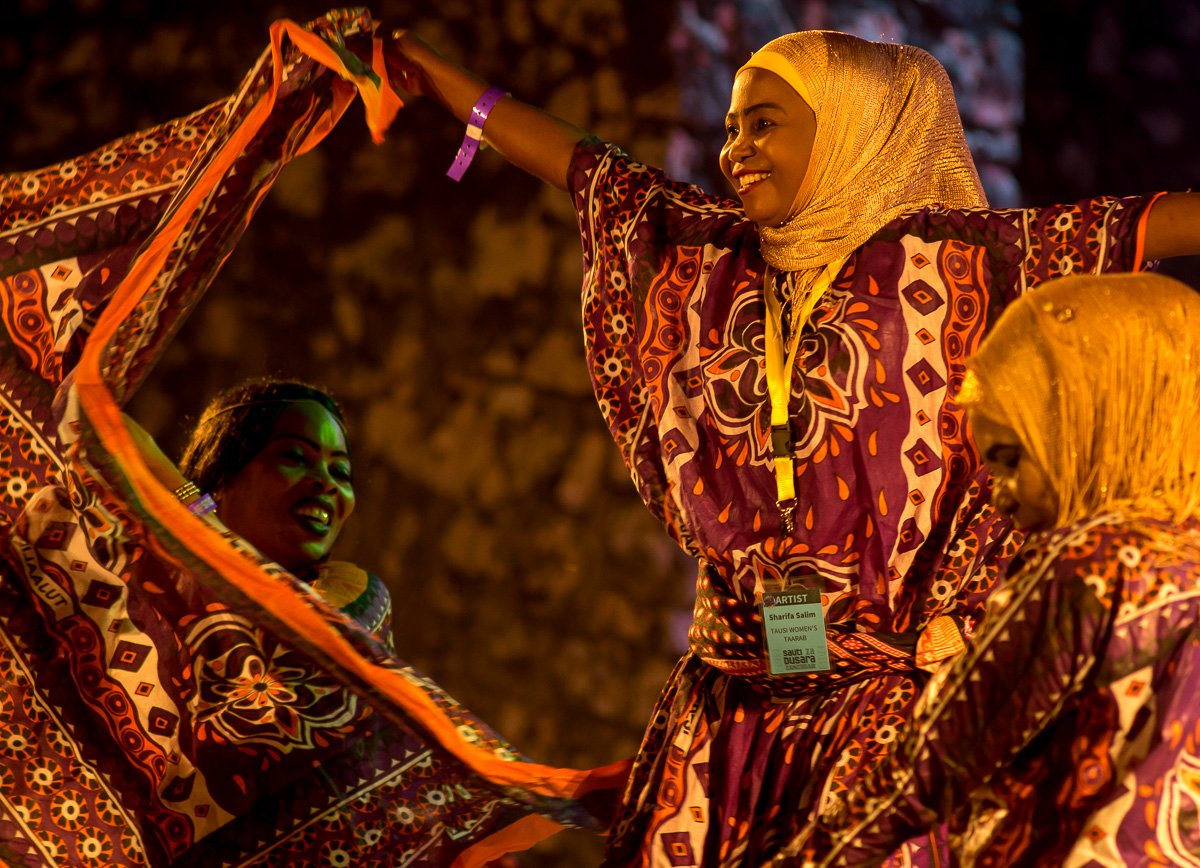 These new tendencies found political expression after the national referendum of 2010, when the CUF and the CCM came together in a truce that didn’t last. A new organisation called Umasho, which means ‘The Awakening’, began to make its presence felt, advocating a stricter observance of Islam, the imposition of shari’a law, and independence from the mainland. They preached the belief that so many of the forces of moral decay - prostitution, alcohol, drugs, lax religious observance, theft, licentious music and dancing etc etc - could be blamed on the influence of the mainland, and that Zanzibar would be better off alone. Umasho also issued a code of conduct for tourists that insisted on a proper dress code, restrictions on alcohol and segregated beaches. They found easy converts amongst disaffected jobless youth who felt they had run out of political options. A government crackdown in May 2012 and the arrest of Umasho's leader Farid Hadi Ahmed in October, provoked a series of violent attacks on religious leaders and institutions. Acid was thrown in the face of a moderate muslim cleric, a catholic priest was shot and wounded, a policeman was killed, a church belonging to the Assemblies of God was attacked by a violent mob and burned to the ground. In August 2013 to young female British tourists suffered an acid attack in Stone Town. The police conducted raids on the homes and premises of Umasho activists, and retrieved 29 litres of acid. There were many arrests and the violence subsided, but the ideology behind Umasho lives on.
These new tendencies found political expression after the national referendum of 2010, when the CUF and the CCM came together in a truce that didn’t last. A new organisation called Umasho, which means ‘The Awakening’, began to make its presence felt, advocating a stricter observance of Islam, the imposition of shari’a law, and independence from the mainland. They preached the belief that so many of the forces of moral decay - prostitution, alcohol, drugs, lax religious observance, theft, licentious music and dancing etc etc - could be blamed on the influence of the mainland, and that Zanzibar would be better off alone. Umasho also issued a code of conduct for tourists that insisted on a proper dress code, restrictions on alcohol and segregated beaches. They found easy converts amongst disaffected jobless youth who felt they had run out of political options. A government crackdown in May 2012 and the arrest of Umasho's leader Farid Hadi Ahmed in October, provoked a series of violent attacks on religious leaders and institutions. Acid was thrown in the face of a moderate muslim cleric, a catholic priest was shot and wounded, a policeman was killed, a church belonging to the Assemblies of God was attacked by a violent mob and burned to the ground. In August 2013 to young female British tourists suffered an acid attack in Stone Town. The police conducted raids on the homes and premises of Umasho activists, and retrieved 29 litres of acid. There were many arrests and the violence subsided, but the ideology behind Umasho lives on.
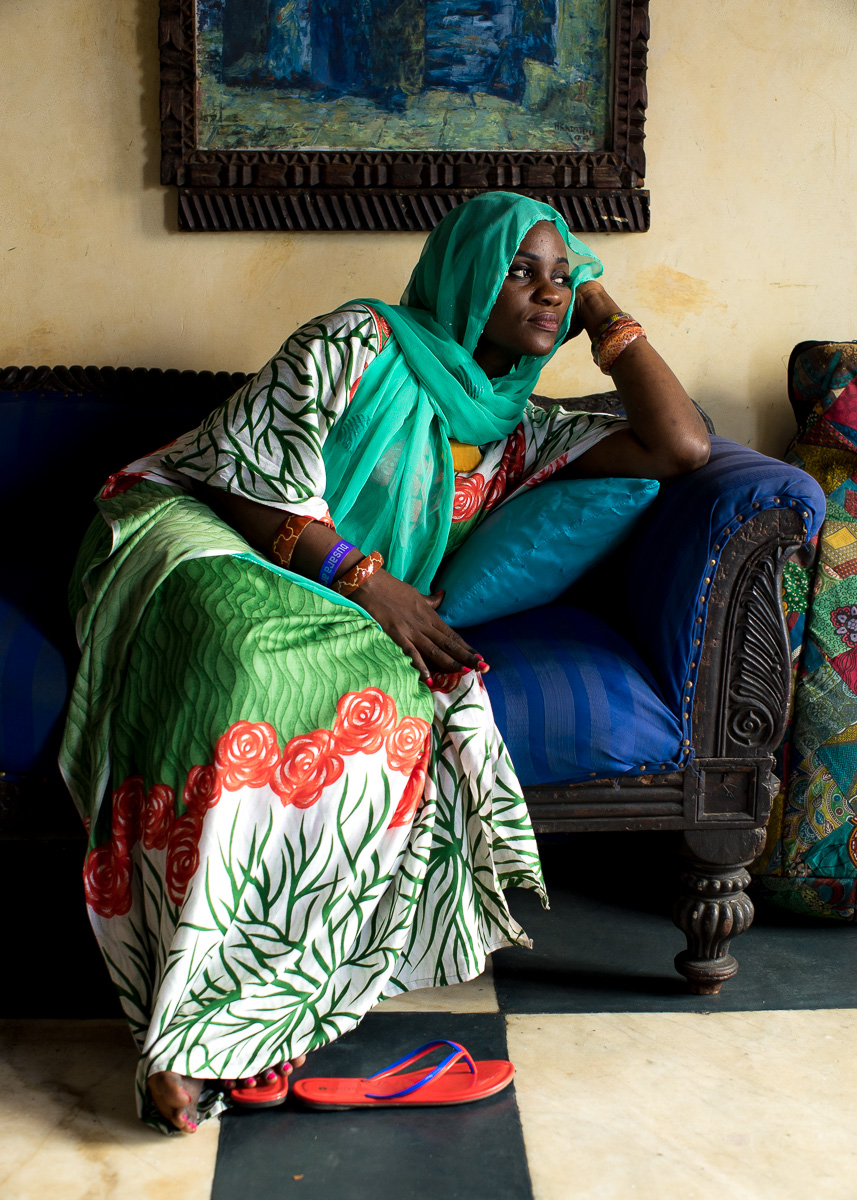 Siti Amina Omar (pictured left) plays oud and sings with the Tausi orchestra, and leads her own combo, Siti and The Band. She’s a star student at the DCMA and this year was also one of the mainstays of the Swahili Encounters project. She arrives for our rendezvous at my hotel carrying her oud in a richly coloured cloth case. She has green chiffon scarf covering her head, and long robe printed with red roses and green waves. On her feet, a simple pair of red flip flops. She’s elegant, demure but candid once the conversation starts to flow. “When I was singing and learning oud, I had to carry the instrument from my home to the school, and in the streets people would stop, and it was like ‘Have you seen that?! She’s a musician!’ Some of them would say ‘what are you doing?!’ Or they would go to my family and demand to know why they let me do this. Many wouldn’t even say hi. In Africa, we like ubuntu. We depend on each other, we share. So in the streets, you can’t just pass people by and say nothing.” ‘Ubuntu’ is a very resonant African word meaning everything that binds a society together: understanding, compassion, altruism, humanity.
Siti Amina Omar (pictured left) plays oud and sings with the Tausi orchestra, and leads her own combo, Siti and The Band. She’s a star student at the DCMA and this year was also one of the mainstays of the Swahili Encounters project. She arrives for our rendezvous at my hotel carrying her oud in a richly coloured cloth case. She has green chiffon scarf covering her head, and long robe printed with red roses and green waves. On her feet, a simple pair of red flip flops. She’s elegant, demure but candid once the conversation starts to flow. “When I was singing and learning oud, I had to carry the instrument from my home to the school, and in the streets people would stop, and it was like ‘Have you seen that?! She’s a musician!’ Some of them would say ‘what are you doing?!’ Or they would go to my family and demand to know why they let me do this. Many wouldn’t even say hi. In Africa, we like ubuntu. We depend on each other, we share. So in the streets, you can’t just pass people by and say nothing.” ‘Ubuntu’ is a very resonant African word meaning everything that binds a society together: understanding, compassion, altruism, humanity.
Siti Amina’s grandfather was Shaaban Khameis Mloo, one of the founders of the CUF. He was also a musician, and a songwriter. As a girl, she found taarab boring - music for old folk. Like most Zanzibari teenagers, she loved bongo flava and Nigerian pop. But she knew she wanted to sing and play music. Before getting married, she spoke to her husband about her dream. He told her he loved music, and seemed supportive. But when they moved to Dar el Salam, and Amina gave birth to a boy, her husband started to clamp down on any thoughts of playing music professionally. His friends had told him that it was dangerous to let a wife enter that world. Despite his objections, Amina decided to enter a nationwide Tanzanian talent show called Bongo Star Search. She won the Zanzibar heats but was eliminated in the final phase. After her husband had brought her home they fought, bitterly. “Like boxing!” she recalls. So she left him, took her boy, and went back to Zanzibar.
I admire Bi Kidude very much. She was free. And very strong. We're still inspired by her
“For me, I can live anywhere,” she says, “but the most important thing is to be free, and do what you want to do.” She talks about the courage that you need to stand in front of an audience and sing, especially if you’re a woman. “Lots of singers have a very beautiful voice and could play all over the world. But only one or two can do it. The rest cannot.” She tells me that she inherited her own courage from late Bi Kidude, one of the most famous singers in the history of Zanzibar, who was born at the bottom of the social pyramid but grew to become a global star and died at an advanced age in 2013. And Bi Kidude in turn inherited her courage from Siti Binti Saad,
an ordinary Swahili girl who became the ‘mother’ of Taarab at the turn of the 20th century, and even recorded with the British Gramophone Company in Bombay in 1905. Binti Saad, whose moniker ‘siti’ meaning ‘lady’ in Arabic has been adopted by Amina, had immense courage and wrote hundreds of songs about the struggles of women and children in a rigidly patriarchal society. Did Amina know Bi Kidude, I ask. “Yes, very well.” What was she like? “Crazy!” she answers, laughing. “I admire her very much. She was free. And very strong. We’re still inspired by her: from Siti Binti to her, and from her to us.”
I ask if she's a feminist. She bursts out laughing. "A little bit," she says
I ask her if she’s a feminist. She bursts out laughing. “A little bit,” she says. “A little bit…yah. But I love my culture. I love my religion. Honestly. It’s our argument. It’s important for people to have arguments that can guide them. Otherwise, you do whatever you like, and it’s not good. So in Zanzibar, we decided to believe in God. And honestly, it’s peaceful. We love each other. For me, I’m afraid to hurt someone, because I know God will not be happy with with me. So I love that system, because it means we won’t hurt each other.
"Most westerners who passed Siti Amina in the street would most likely form a prejudicial image in their minds of a woman bound and tied by her religion, her culture, without hope of expressing her true self in word or deed or music, dance, any other way. But behind that green shawl I sense a heart yearning for music and release and struggling with history, culture and religion, whilst also find immense power and strength in all of them. “I know that in society, anything can be a good thing, and a bad,” she says. “Positive, and negative.” 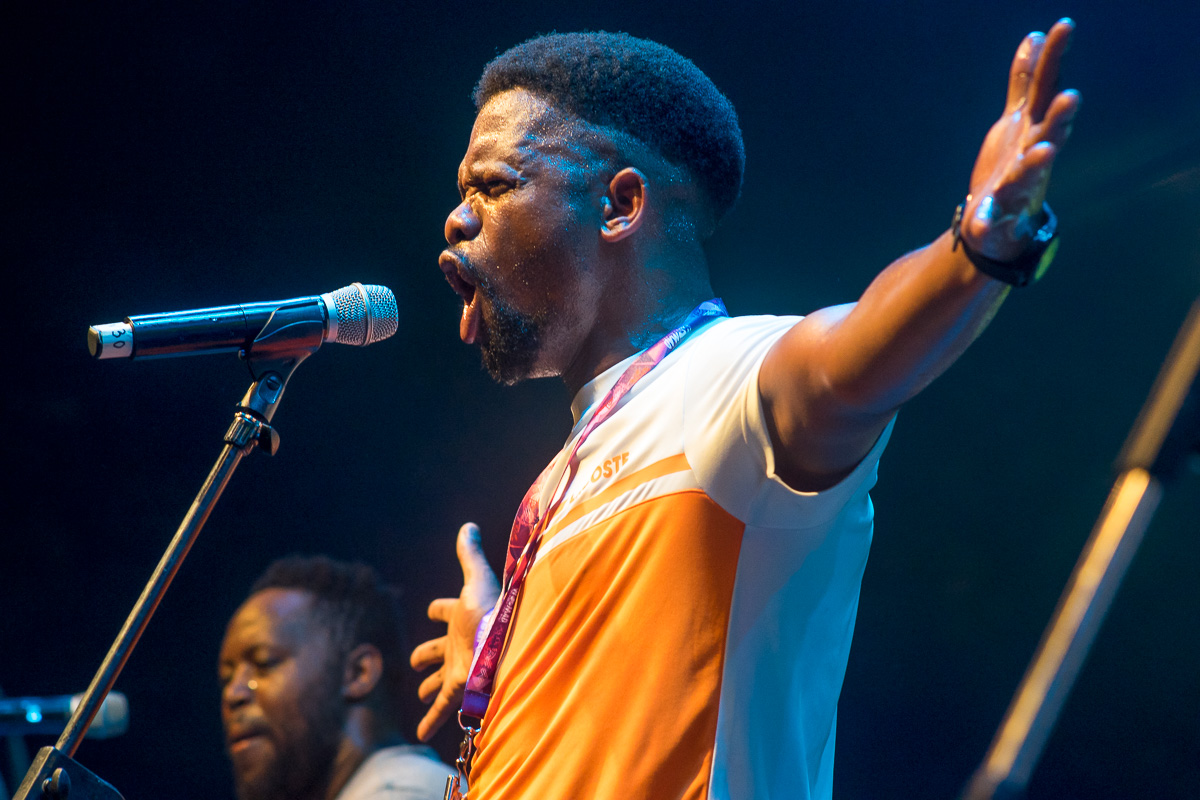 Farooq the fashion designer told me that “Underneath the surface, behind the veil, there’s more than what you see. Everything that’s happening elsewhere in the world, is happening here in Zanzibar. But it’s underground. And it’s all done in a civilised manner. People are not cruel.” Political strife, racial hatred, exploitation, thievery, prostitution, drug addiction, alcoholism, religious intolerance, poverty, desperation, they’re all here, behind that warm, easy, slow exotic face. But something else is at play, something precious and hard to define. Something to do with ubuntu, community, respect for others and…yes…respect for a higher being. At BCUC’s press conference after their headlining performance on the main stage on Saturday, lead singer Jovi (pictured above) was asked what he would take away from his visit to Zanzibar. “I’ve noticed that there are a lot of white people carrying a lot of expensive gear around with them, cameras and such,” he said (I’m paraphrasing his answer). “In Soweto, or Lagos, they wouldn’t last ten seconds. But here they get away with it. I’m wondering why that is? Maybe it’s something to do with the religion. I don’t know.”
Farooq the fashion designer told me that “Underneath the surface, behind the veil, there’s more than what you see. Everything that’s happening elsewhere in the world, is happening here in Zanzibar. But it’s underground. And it’s all done in a civilised manner. People are not cruel.” Political strife, racial hatred, exploitation, thievery, prostitution, drug addiction, alcoholism, religious intolerance, poverty, desperation, they’re all here, behind that warm, easy, slow exotic face. But something else is at play, something precious and hard to define. Something to do with ubuntu, community, respect for others and…yes…respect for a higher being. At BCUC’s press conference after their headlining performance on the main stage on Saturday, lead singer Jovi (pictured above) was asked what he would take away from his visit to Zanzibar. “I’ve noticed that there are a lot of white people carrying a lot of expensive gear around with them, cameras and such,” he said (I’m paraphrasing his answer). “In Soweto, or Lagos, they wouldn’t last ten seconds. But here they get away with it. I’m wondering why that is? Maybe it’s something to do with the religion. I don’t know.”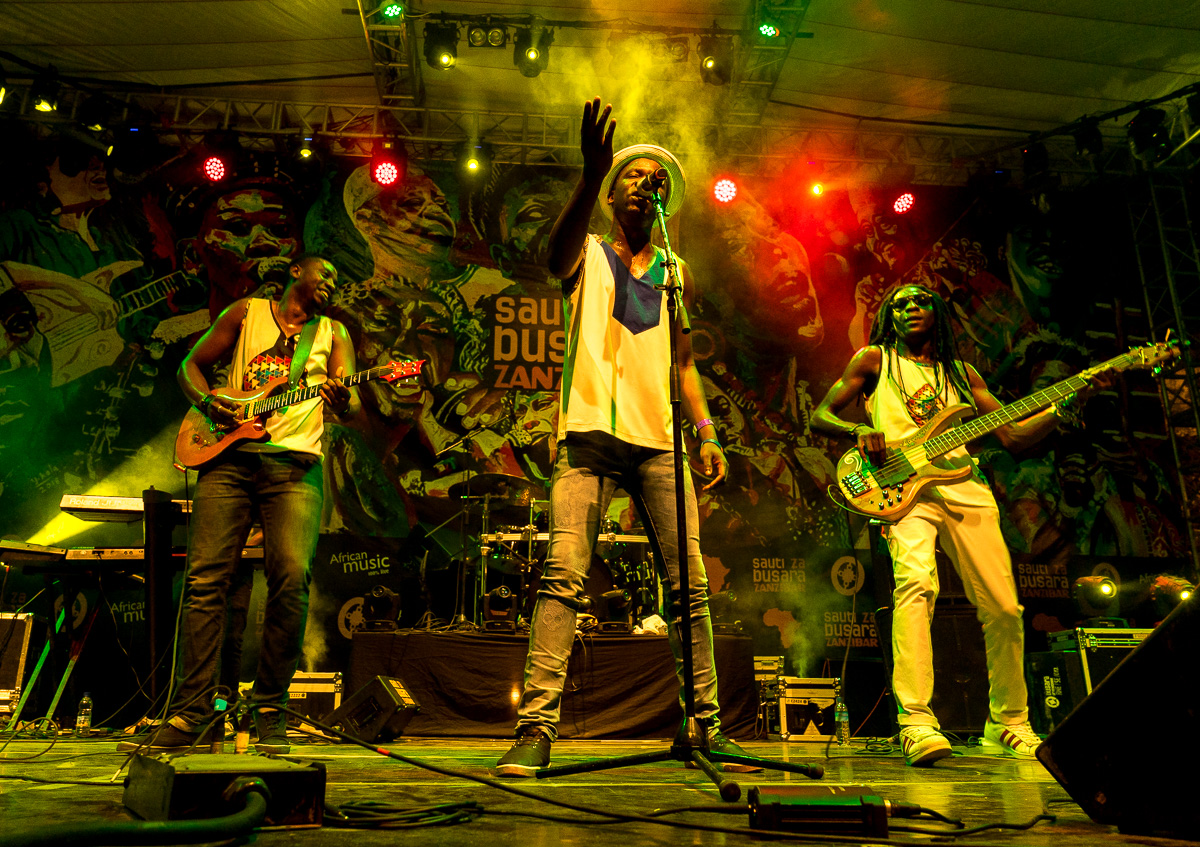 Mokoomba from Zimbabwe (pictured above) close the festival with a finely-honed set of modern zimpop that seems to hold everything from reggae, to funk, Congolese soukous and chimurenga beats coiled up in its DNA. They’re the latter-day offspring of Thomas Mapfumo, with less revolution perhaps, and more insouciant boogalicious sweat. For expertise and energy, their set can’t be faulted, and it reaches a climax when they perform a version of the classic ‘Todii’ by late and much-lamented Oliver Mutukudzi, whose death at the height of the height of Zimbabwe’s recent civil strife pitched the entire nation into a period of deep mourning. As Mokoomba roll out the first few bars of the song, the lead vocalist Mathias Muzaza sounding like the utterly faithful child of his musical hero, all the Zanzibaris and Tanzanians in the old fort swoon into a gently ecstatic, swaying joy, mouthing all the lyrics with requisite precision, even though the language isn’t their own. It’s a moment of uplift and grace, a proud display of ubuntu perhaps, that speaks of qualities deep behind the exotic face of this place that are worthy of a deeper love.
Mokoomba from Zimbabwe (pictured above) close the festival with a finely-honed set of modern zimpop that seems to hold everything from reggae, to funk, Congolese soukous and chimurenga beats coiled up in its DNA. They’re the latter-day offspring of Thomas Mapfumo, with less revolution perhaps, and more insouciant boogalicious sweat. For expertise and energy, their set can’t be faulted, and it reaches a climax when they perform a version of the classic ‘Todii’ by late and much-lamented Oliver Mutukudzi, whose death at the height of the height of Zimbabwe’s recent civil strife pitched the entire nation into a period of deep mourning. As Mokoomba roll out the first few bars of the song, the lead vocalist Mathias Muzaza sounding like the utterly faithful child of his musical hero, all the Zanzibaris and Tanzanians in the old fort swoon into a gently ecstatic, swaying joy, mouthing all the lyrics with requisite precision, even though the language isn’t their own. It’s a moment of uplift and grace, a proud display of ubuntu perhaps, that speaks of qualities deep behind the exotic face of this place that are worthy of a deeper love.
rating
Explore topics
Share this article
Add comment
The future of Arts Journalism
You can stop theartsdesk.com closing!
We urgently need financing to survive. Our fundraising drive has thus far raised £49,000 but we need to reach £100,000 or we will be forced to close. Please contribute here: https://gofund.me/c3f6033d
And if you can forward this information to anyone who might assist, we’d be grateful.

Subscribe to theartsdesk.com
Thank you for continuing to read our work on theartsdesk.com. For unlimited access to every article in its entirety, including our archive of more than 15,000 pieces, we're asking for £5 per month or £40 per year. We feel it's a very good deal, and hope you do too.
To take a subscription now simply click here.
And if you're looking for that extra gift for a friend or family member, why not treat them to a theartsdesk.com gift subscription?
more New music
 Houghton / We Out Here festivals review - an ultra-marathon of community vibes
Two different but overlapping flavours of subculture full of vigour
Houghton / We Out Here festivals review - an ultra-marathon of community vibes
Two different but overlapping flavours of subculture full of vigour
 Album: Deftones - Private Music
Deftones give us a glimmer of hope, but that's all...
Album: Deftones - Private Music
Deftones give us a glimmer of hope, but that's all...
 Album: Eve Adams - American Dust
Taking inspiration from the Californian desert
Album: Eve Adams - American Dust
Taking inspiration from the Californian desert
 Gibby Haynes, O2 Academy 2, Birmingham review - ex-Butthole Surfer goes School of Rock
Butthole Surfers’ frontman is still flying his freak flag but in a slightly more restrained manner
Gibby Haynes, O2 Academy 2, Birmingham review - ex-Butthole Surfer goes School of Rock
Butthole Surfers’ frontman is still flying his freak flag but in a slightly more restrained manner
 Album: Adrian Sherwood - The Collapse of Everything
The dub maestro stretches out and chills
Album: Adrian Sherwood - The Collapse of Everything
The dub maestro stretches out and chills
 Music Reissues Weekly: The Residents - American Composer's Series
James Brown, George Gershwin, John Philip Sousa and Hank Williams as seen through an eyeball-headed lens
Music Reissues Weekly: The Residents - American Composer's Series
James Brown, George Gershwin, John Philip Sousa and Hank Williams as seen through an eyeball-headed lens
 Album: Dinosaur Pile-Up - I've Felt Better
Heavy rock power pop trio return after an unwanted lengthy break
Album: Dinosaur Pile-Up - I've Felt Better
Heavy rock power pop trio return after an unwanted lengthy break
 Album: Tom Grennan - Everywhere I Went Led Me To Where I Didn't Want To Be
British pop star's fourth exhibits ultra-pop oomph with mixed results
Album: Tom Grennan - Everywhere I Went Led Me To Where I Didn't Want To Be
British pop star's fourth exhibits ultra-pop oomph with mixed results
 Album: Emma Smith - Bitter Orange
The award-winning jazz singer brings new life to some classic standards
Album: Emma Smith - Bitter Orange
The award-winning jazz singer brings new life to some classic standards
 BBC Proms: Anoushka Shankar 'Chapters' review - somehow, it worked
Shankar's starry presence brings focus to this orchestral version
BBC Proms: Anoushka Shankar 'Chapters' review - somehow, it worked
Shankar's starry presence brings focus to this orchestral version
 Album: Marissa Nadler - New Radiations
The Nashville-based singer-songwriter explores disconnection
Album: Marissa Nadler - New Radiations
The Nashville-based singer-songwriter explores disconnection
 Album: Rise Against - Ricochet
Have the US punk veterans finally run out of road?
Album: Rise Against - Ricochet
Have the US punk veterans finally run out of road?

Comments
Thanks for writing this story
Does the Arts Desk have
You're right Henry, those
Andy, as ususal a fabulous